Mobilising for change: construction transformation’s first followers set out the next steps
7 October 2019
Summary of the Transforming Construction Network Plus Conference 2019
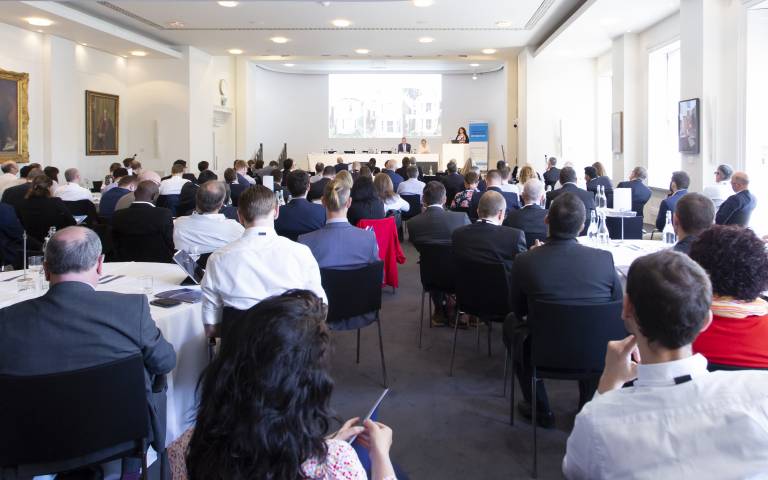
On 19 September 2019, the Transforming Construction Network Plus (N+) hosted its first Annual Conference – Creating a movement for change. Seeking to answer the aspirations of the Transforming Construction Challenge, the conference aimed to inspire interdisciplinary thinking and catalyse new areas of R&D to help transform the way we build.
This one-day conference brought together 150 attendees; a large and diverse audience of academics, industry and government representatives came along to explore new perspectives and contribute to the transformation agenda, which is moving apace within the UK construction sector. The event featured 18 speakers from the UK and beyond, sharing their knowledge and offering new ideas.
As Principal Investigator of the N+, Professor Jacqueline Glass kicked off the conference with a simple but essential message: Join the movement, be the first follower!
Transforming our industry: leading across boundaries
Chaired by Ann Bentley, Global Board Director of Rider Levett Bucknall, the first session brought together Sam Stacey, Challenge Director at UK Research and Innovation, Dr Judit Kimpian, Chair of the Architects Council of Europe’s Sustainability Work Group and Professor David Gann, Professor of Technology and Innovation Management at Imperial College London.
Laying the foundation for the day, Sam Stacey first outlined the history and the future of the Transforming Construction Challenge. Advocating for a real step change in construction industry, he noted a series of reports produced in recent years and argued that little has happened in response to them, because very little has actually changed. Sam covered some of the projects that have been funded through the TCC to date, and showed the latest UKRI funding opportunities – totalling £36m – that are currently open. Sam also highlighted the latest thinking on construction platforms, and the opportunities to engage with the Construction Innovation Hub’s platform design development programme.
’We need to think and act now if we are to achieve 2030 targets!’ - Dr Judit Kimpian, Chair, Architects Council of Europe’s Sustainability Work Group
Dr Judit Kimpian shone a light on some of the transformation challenges relating to the reduction of lifecycle carbon in buildings focusing on the barriers to buildings’ performance. This performance challenge is particularly acute in the context of the existing building stock, because it makes up 80% of the stock we will still have to manage in 2050. Judit highlighted how designing for performance is simply not enough, with building delivery and management factors contributing to a stubborn performance gap. For those designing new buildings, Judit described how increasing a building’s complexity typically results in a worsening performance gap, but she concluded that there was still time to address this, provided people paid attention across both design and delivery phases.
Finally, through a provocative review, Professor David Gann took us through the history of transformation in the construction industry. He gave examples in which major infrastructure clients encouraged the industry to innovate, and argued that such mega-projects should have been awash with innovation. He suggested that one of the reasons was that innovation just doesn’t happen at arms-length, David pointed out that in construction, the chain of contracts gets in the way. Before reinforcing the need for urgent change in the industry through the application of, for example, new materials, new business models, collaborative and digital tools and the adoption of manufacturing technologies, David reminded us that transformation will require a relentless focus on ‘process, process, process’.
This first session concluded with a panel discussion moderated by Hannah Vickers, Chief Executive Officer of the Association for Consultancy and Engineering. During the conversation, Dr Judit Kimpian pointed out that we already know where the issues are, we have funding and we have done enough to share the lessons learned with the stakeholders; rather she argued that now, we just don’t know how to feed it forward into new design and retrofit, and there was much work to do to mobilise such a change.
Download the presentation slides - Session 1 [pdf, 7.5 MB]
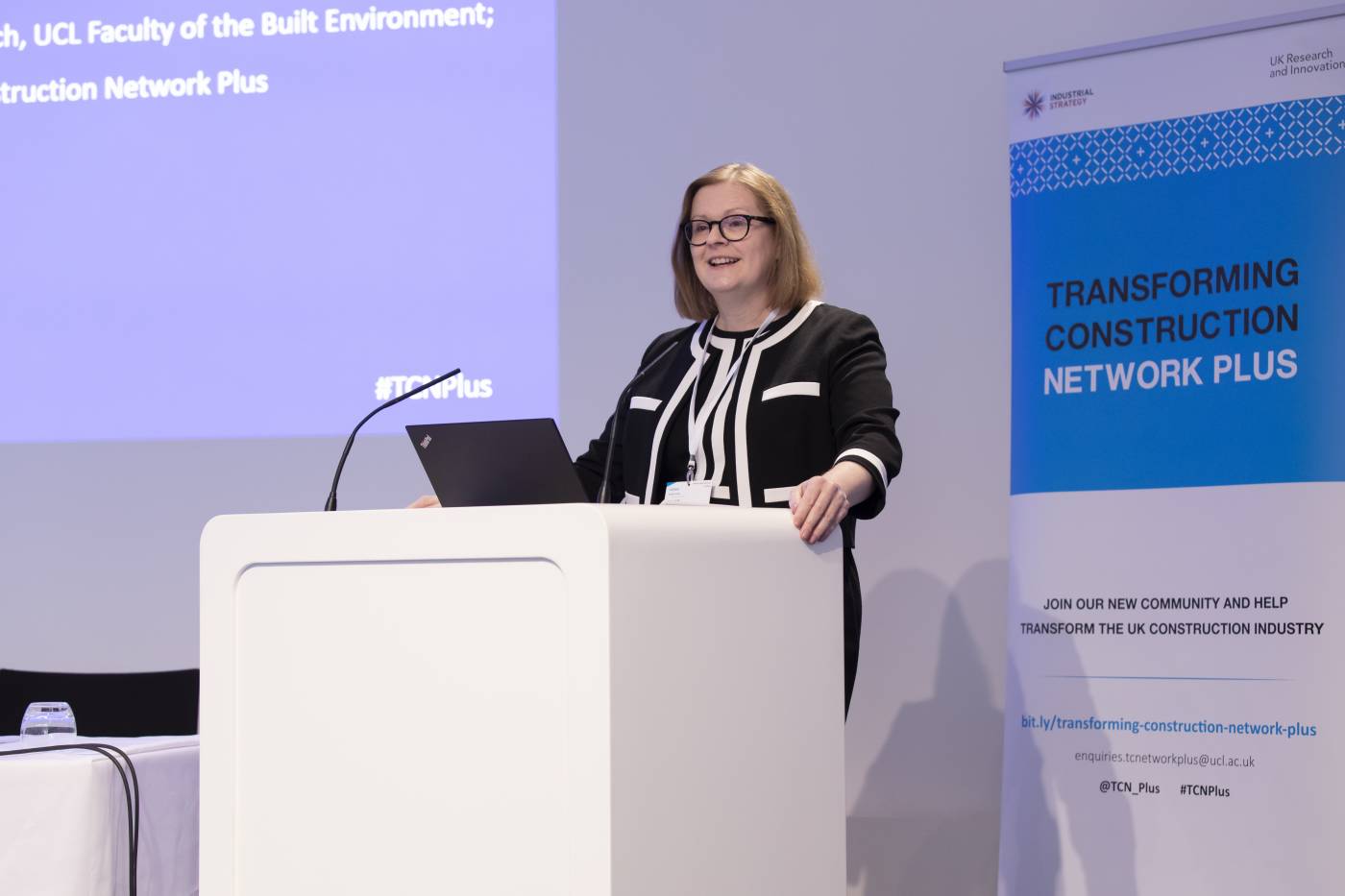
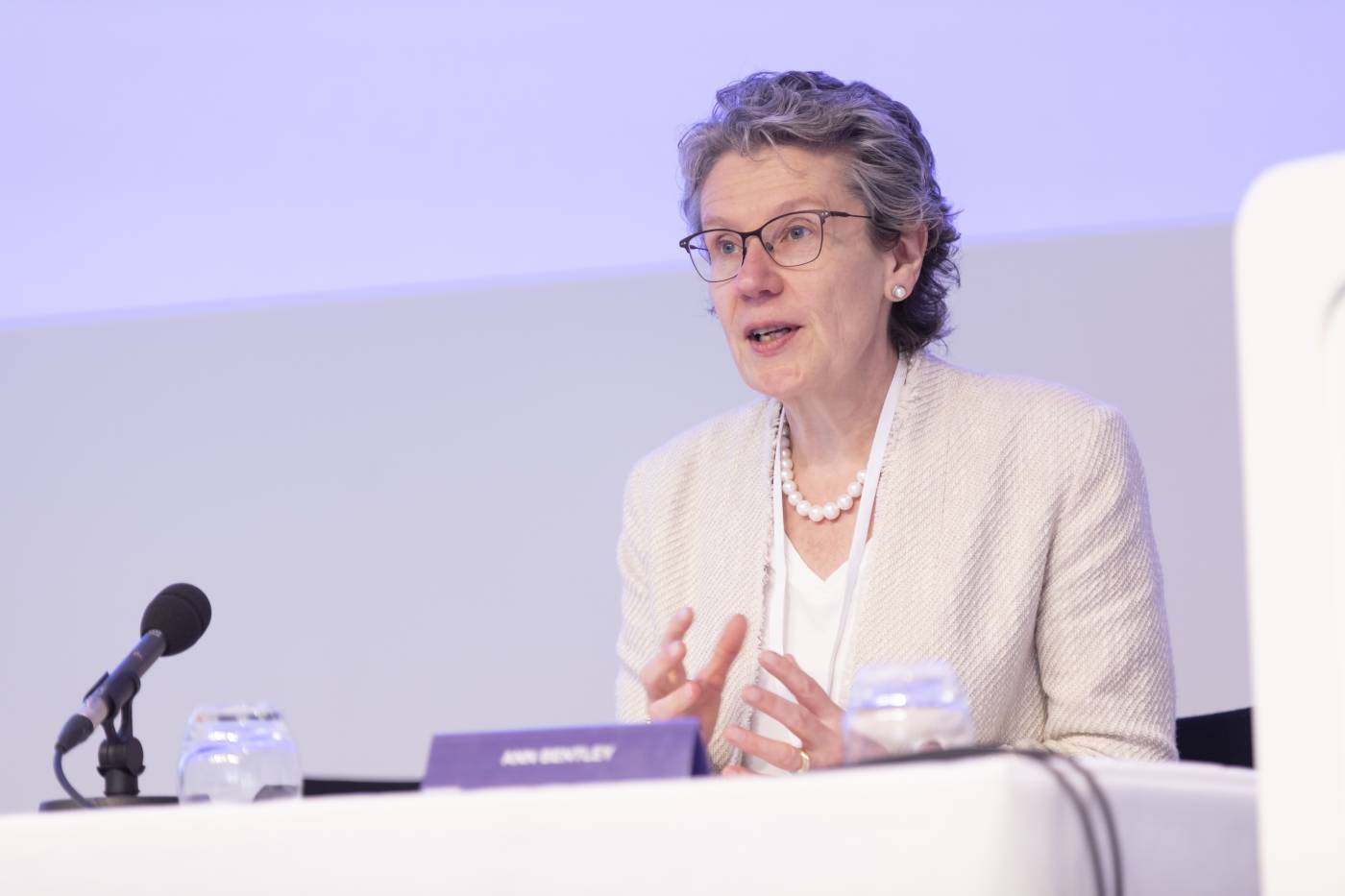
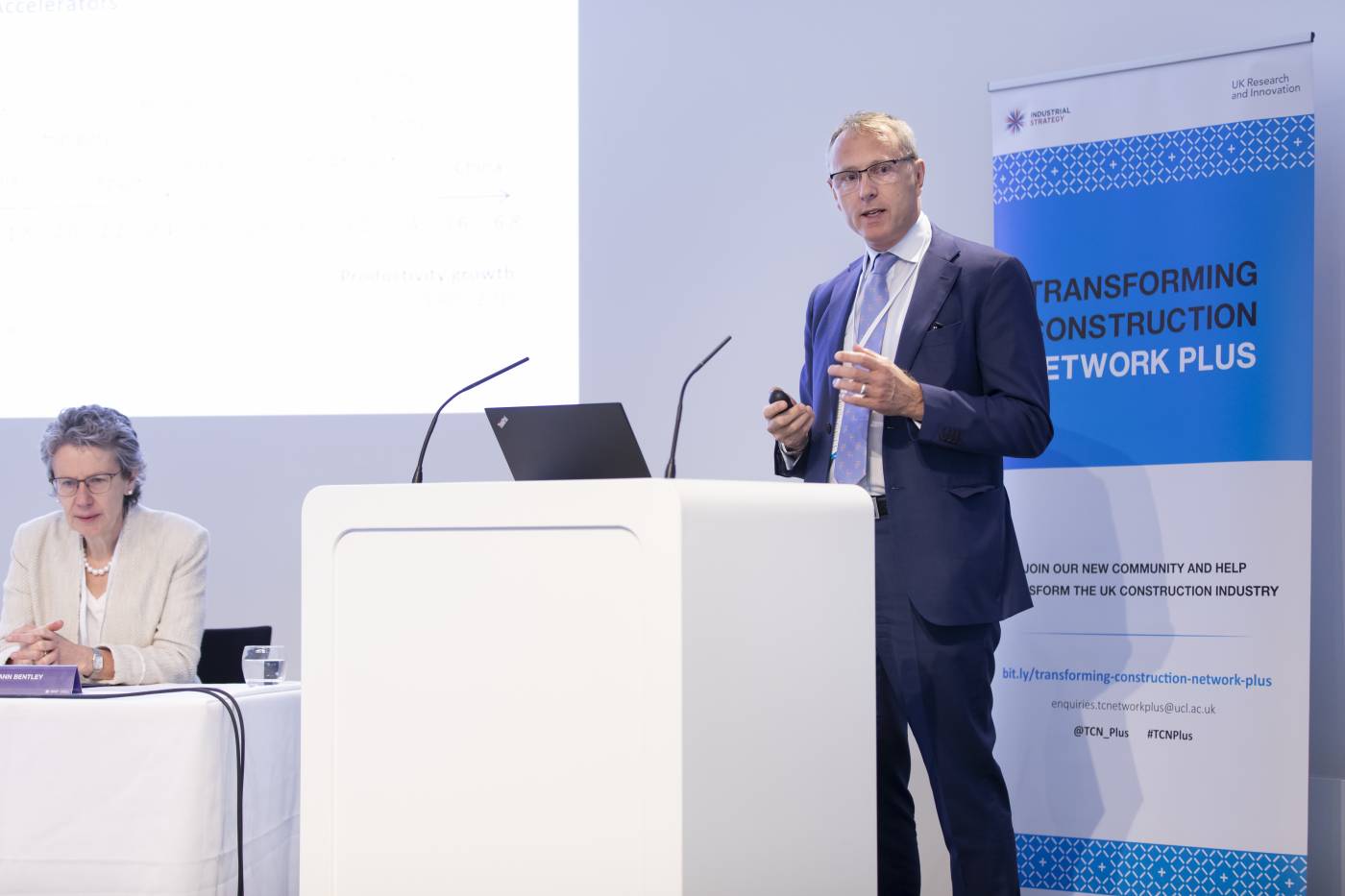
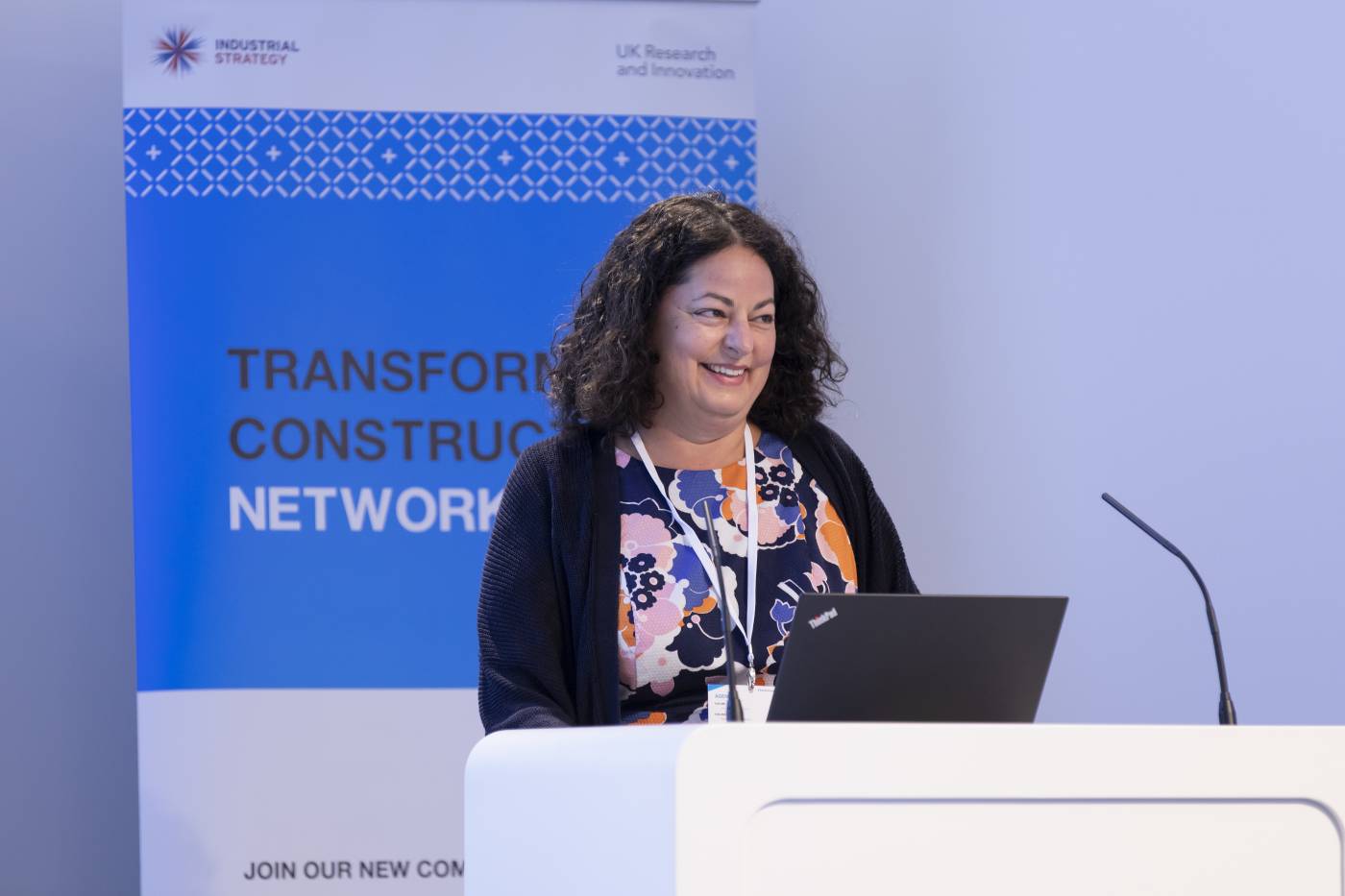
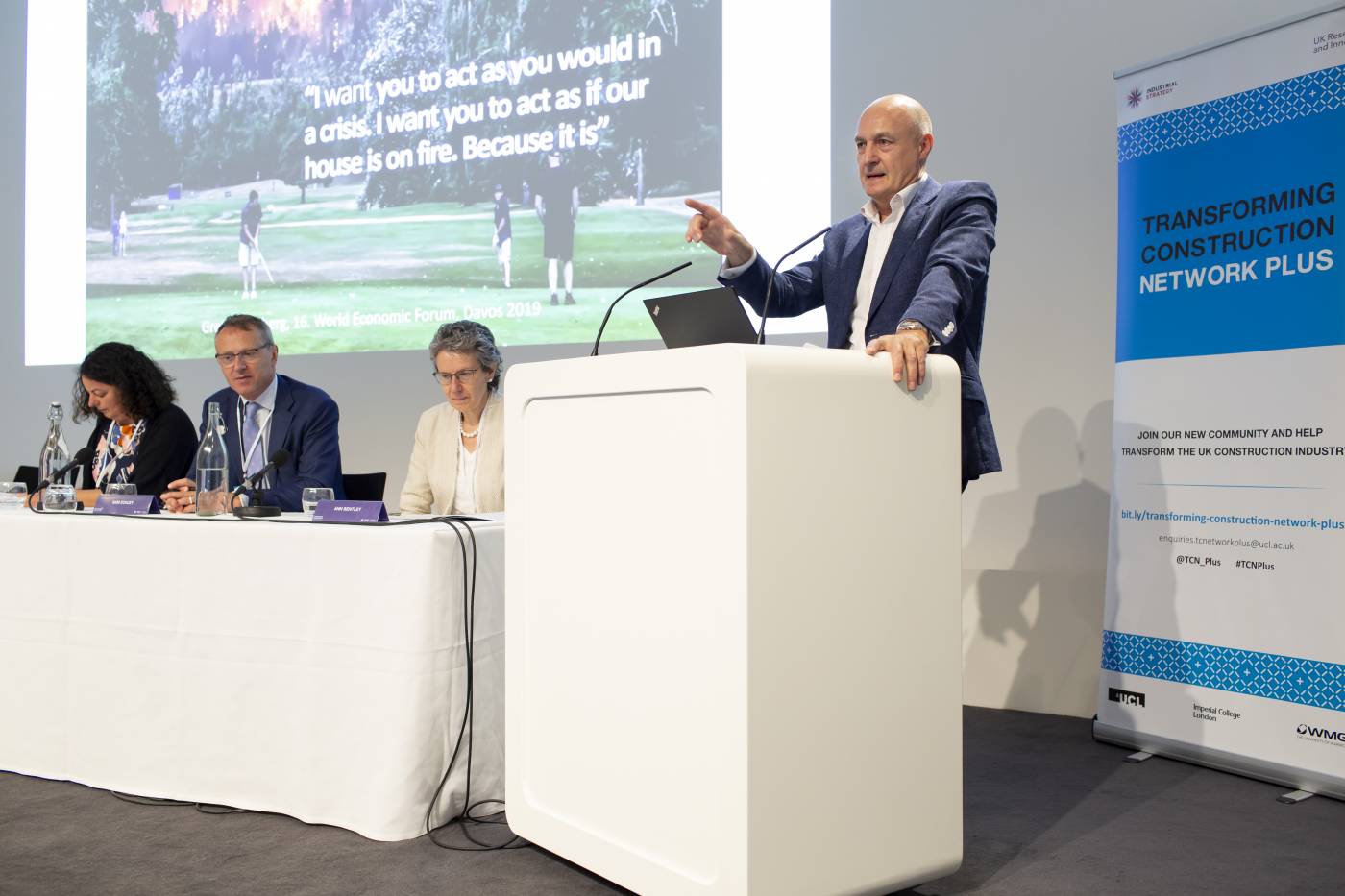
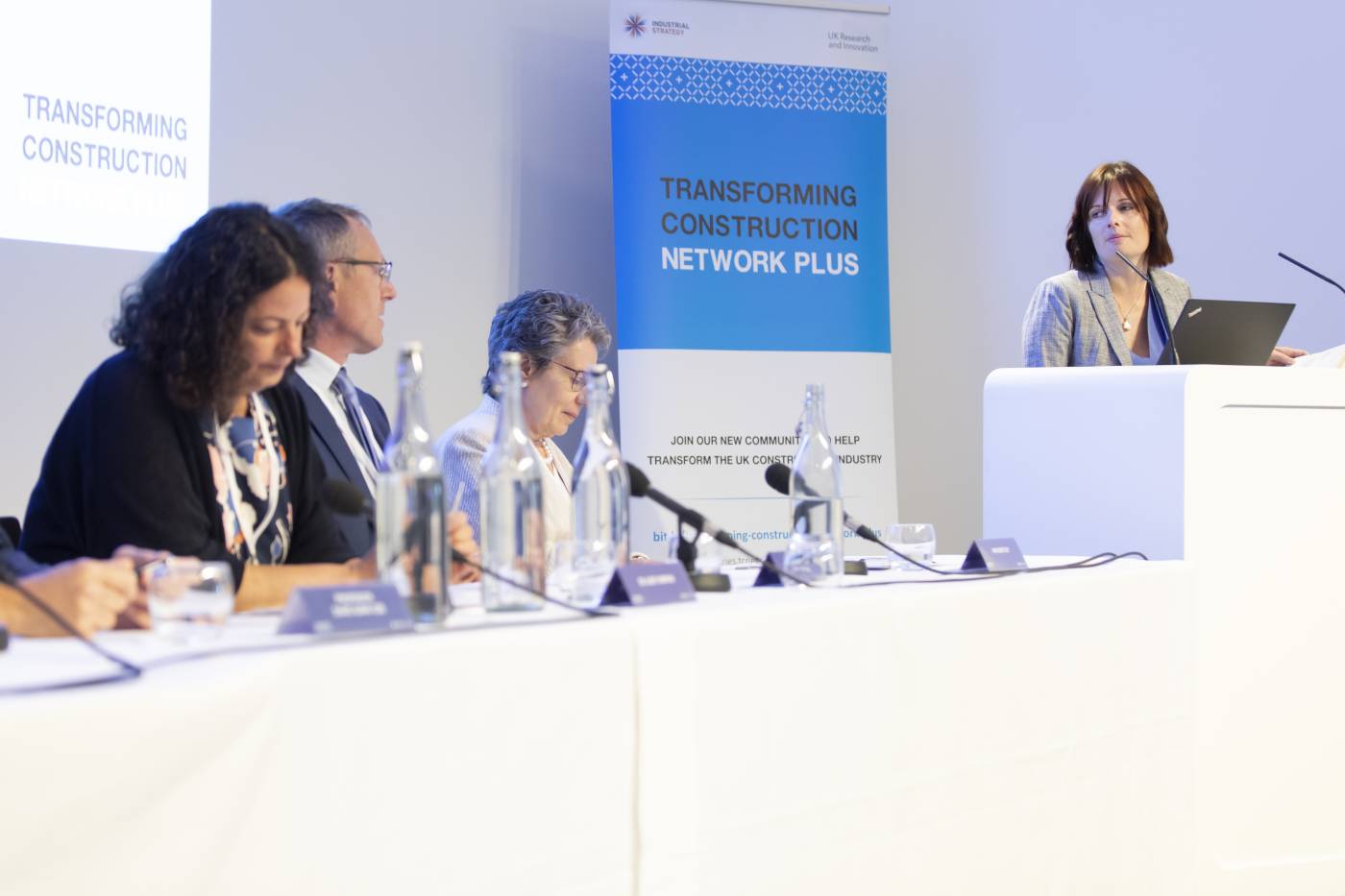
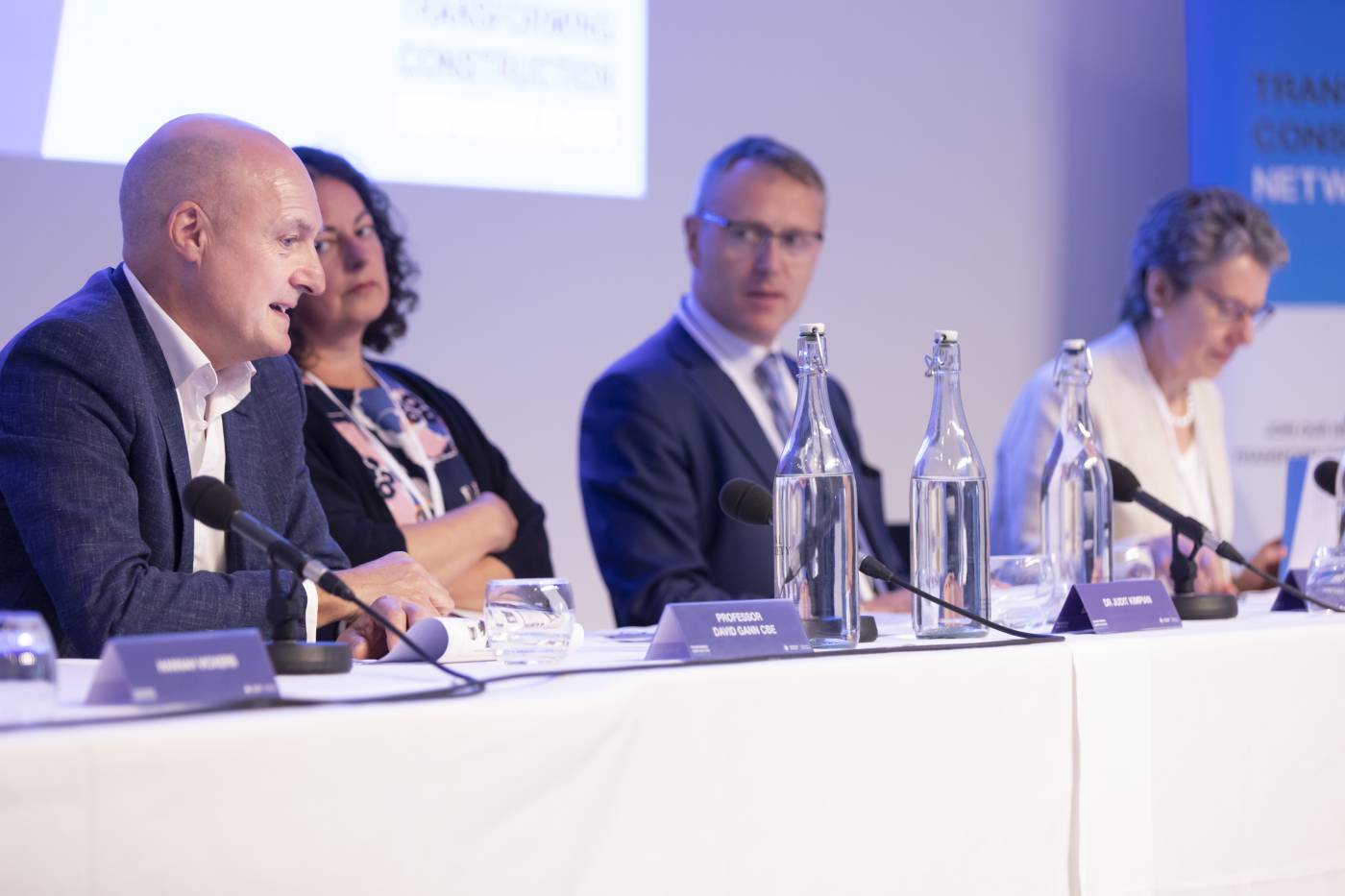
Transforming our research base: collaborative projects showcase
The second session showcased the small projects awarded through the first round of the N+ funding call. Chaired by Fergus Harradence, Deputy Director for Construction at the Department of Business, Energy and Industrial Strategy, the session was followed by a panel discussion moderated by Alison Nicholl, Head of Constructing Excellence, based at BRE.
The first Small Project, Putting people at the heart of future social housing design and manufacture, was presented by Dr Huda Dawood, Senior Research Associate at Teesside University and Professor Paul van Schaik, Professor of Psychology at Teesside University. By systematically integrating user experience (UX) of home use and energy systems with design parameters, the project addresses user needs and requirements, and puts people at the heart of future social housing design and manufacture.
Dr Grant Mills, Associate Professor at UCL, presented Challenging Space Frontiers in Hospitals. This project addresses a future in which hospitals will procure the capabilities to deliver transformational and highly integrated, offsite manufactured hospital theatres by developing interdisciplinary expertise at the nexus of advanced hospital design and research, modern offsite manufacture and transformational spacecraft engineering.
The Small Project Developing consistent benchmarks to drive improved performance in construction projects was presented by Dr Moray Newlands, Senior Lecturer at the University of Dundee. This project identifies performance indicators used by major infrastructure clients and contractors, to determine similarities and differences, and explore the potential appetite for adoption of a common, consistent set of indicators which will drive the development of benchmarks to improve performance.
The session concluded with Dr Robby Soetanto, Senior Lecturer at Loughborough University and Mike Szczygiel, Research Projects Manager at HW Communications Ltd, who presented the project: Digital Enablers for Construction Transformation. This Small Project investigates how radical new concepts for digital technologies in construction could fundamentally redefine its traditional delivery processes and business models.
Download the presentation slides - Session 2 [pdf, 1.2 MB]
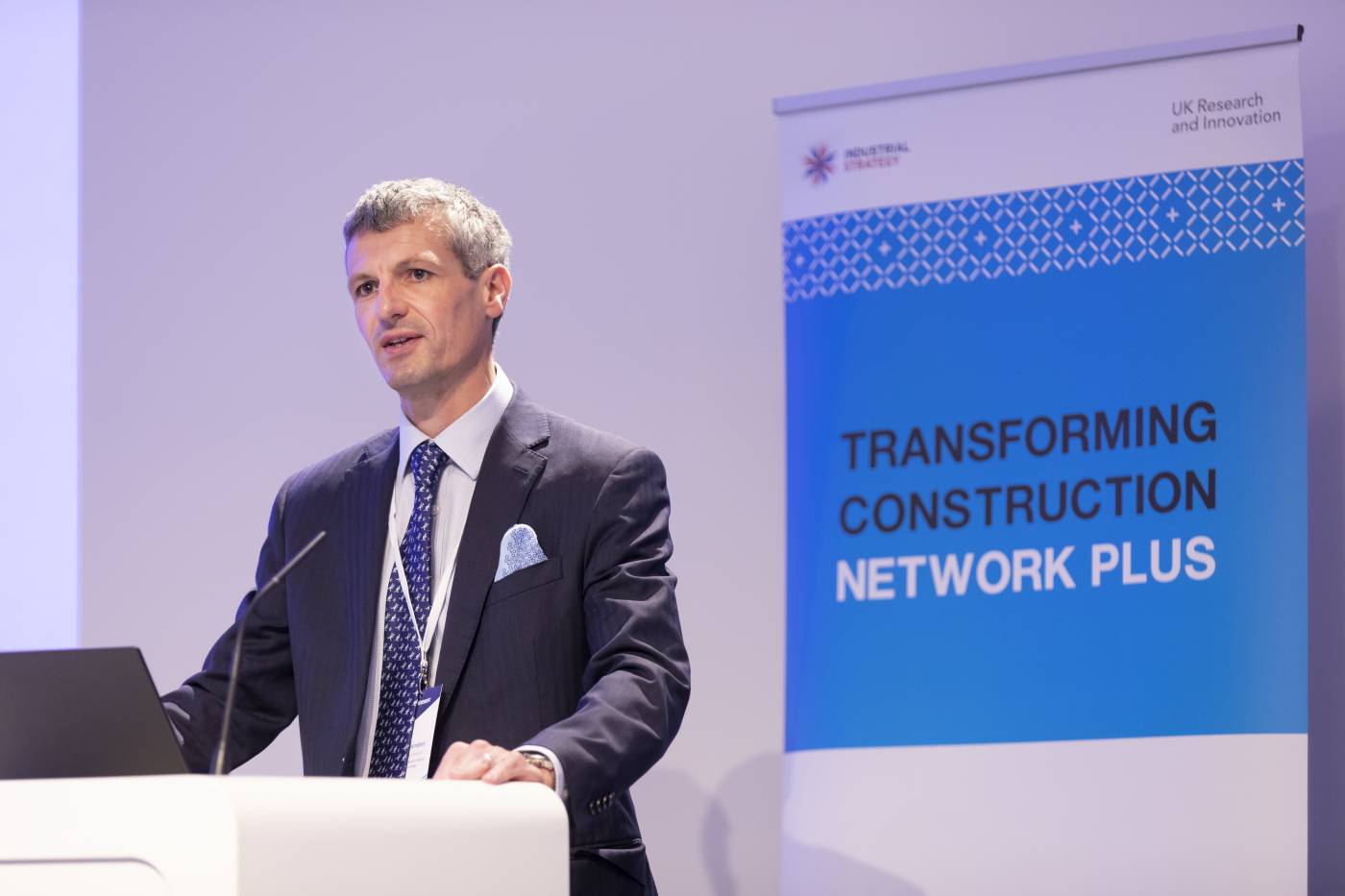
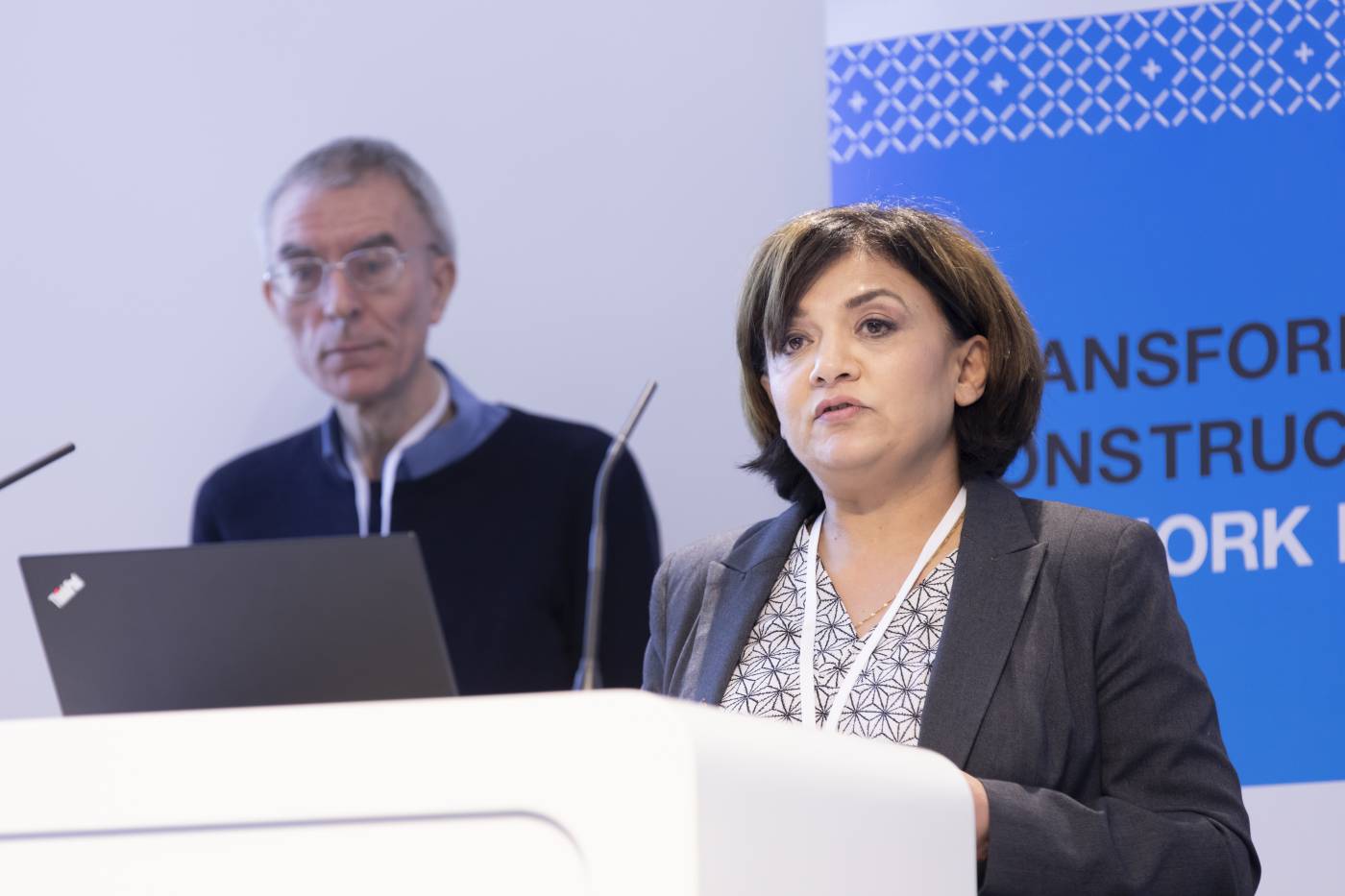
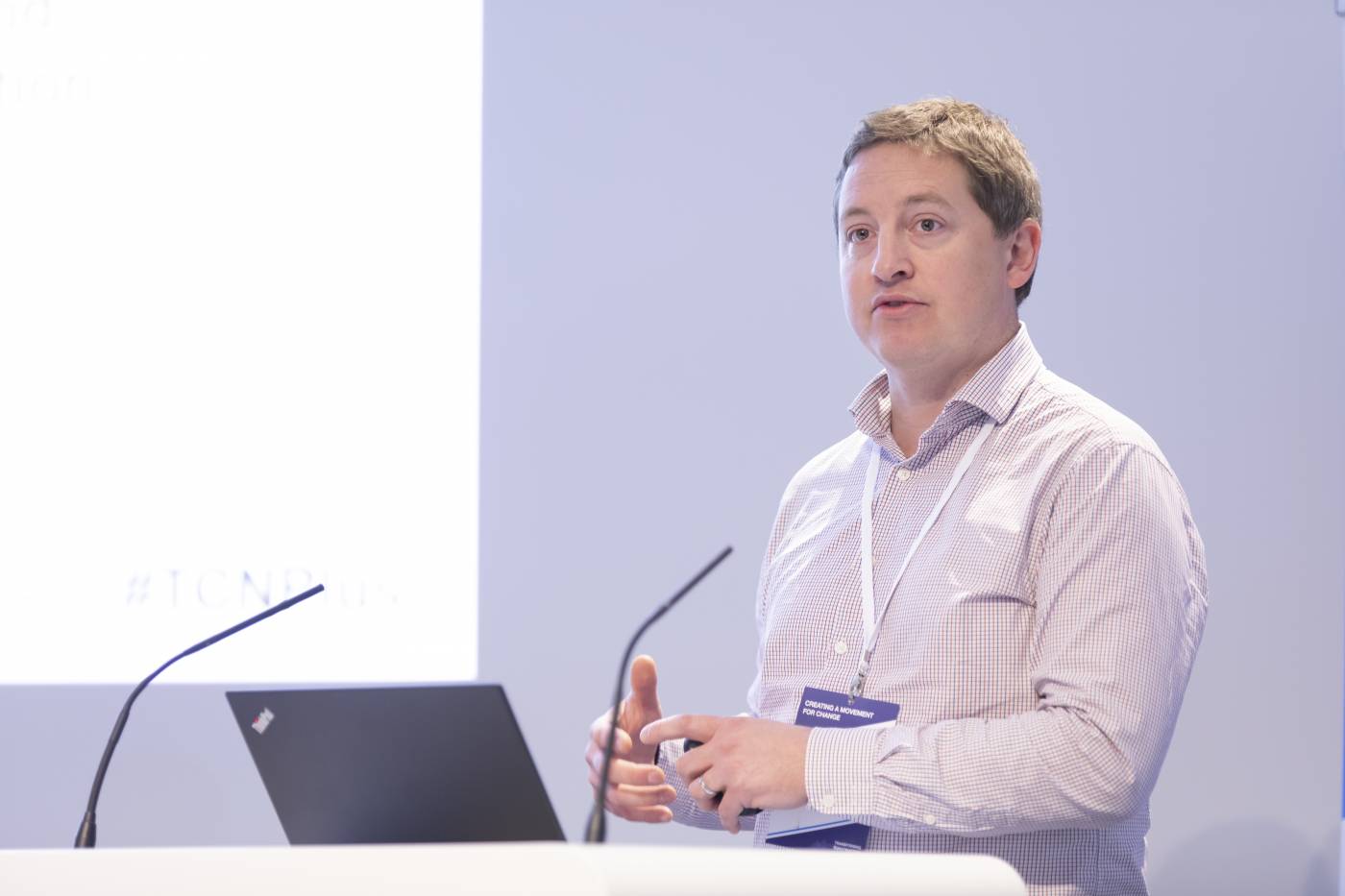
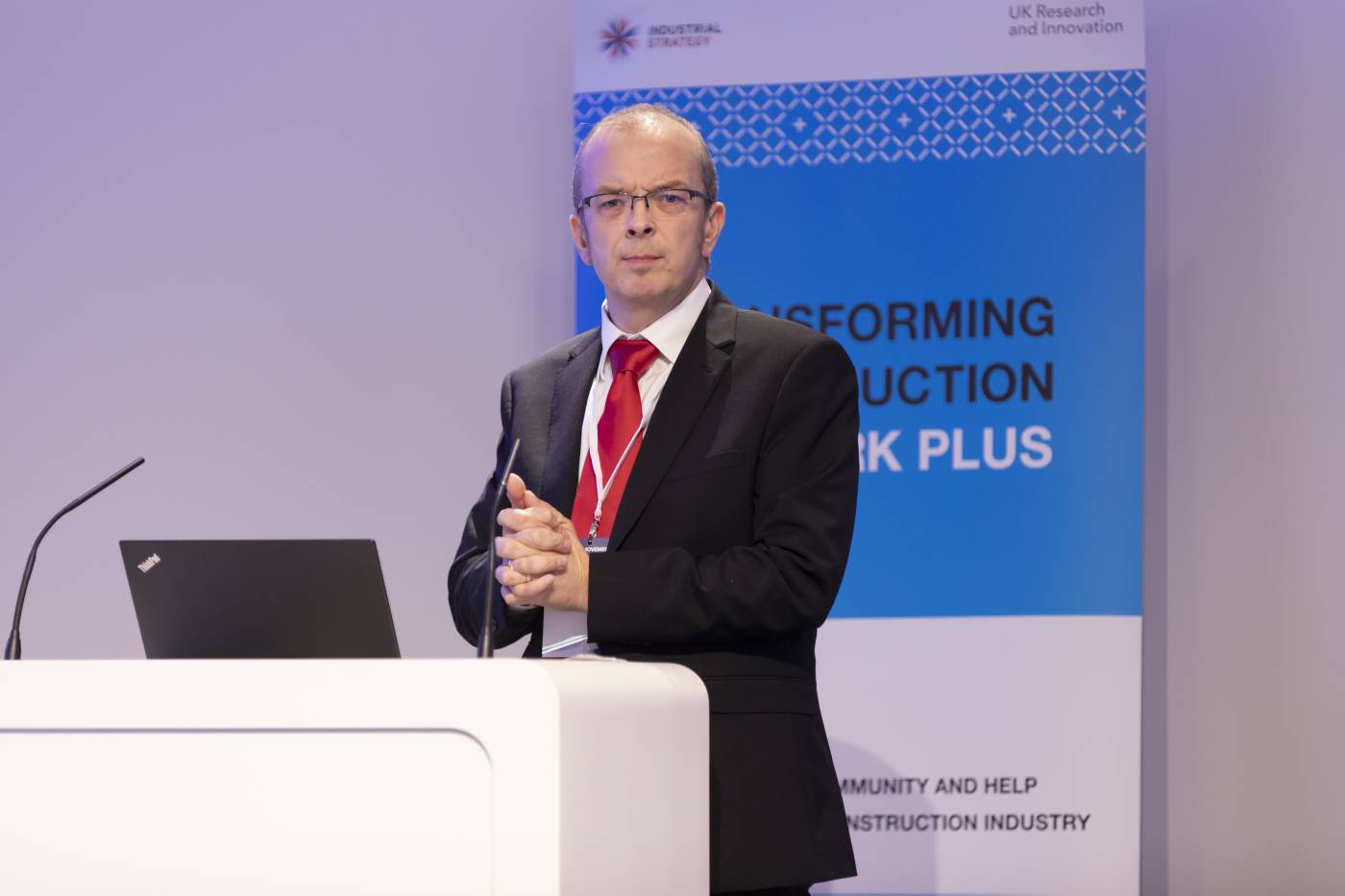
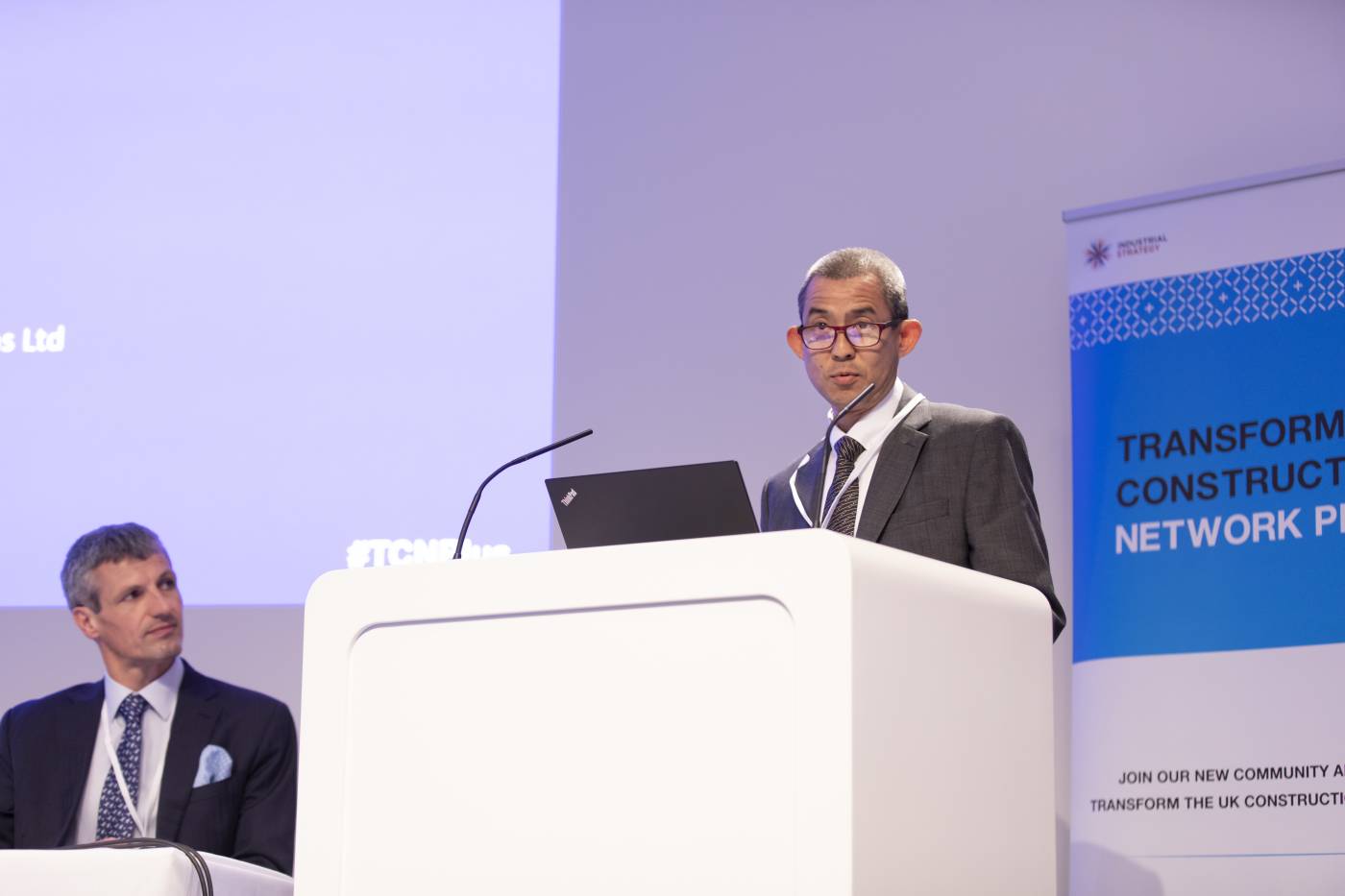
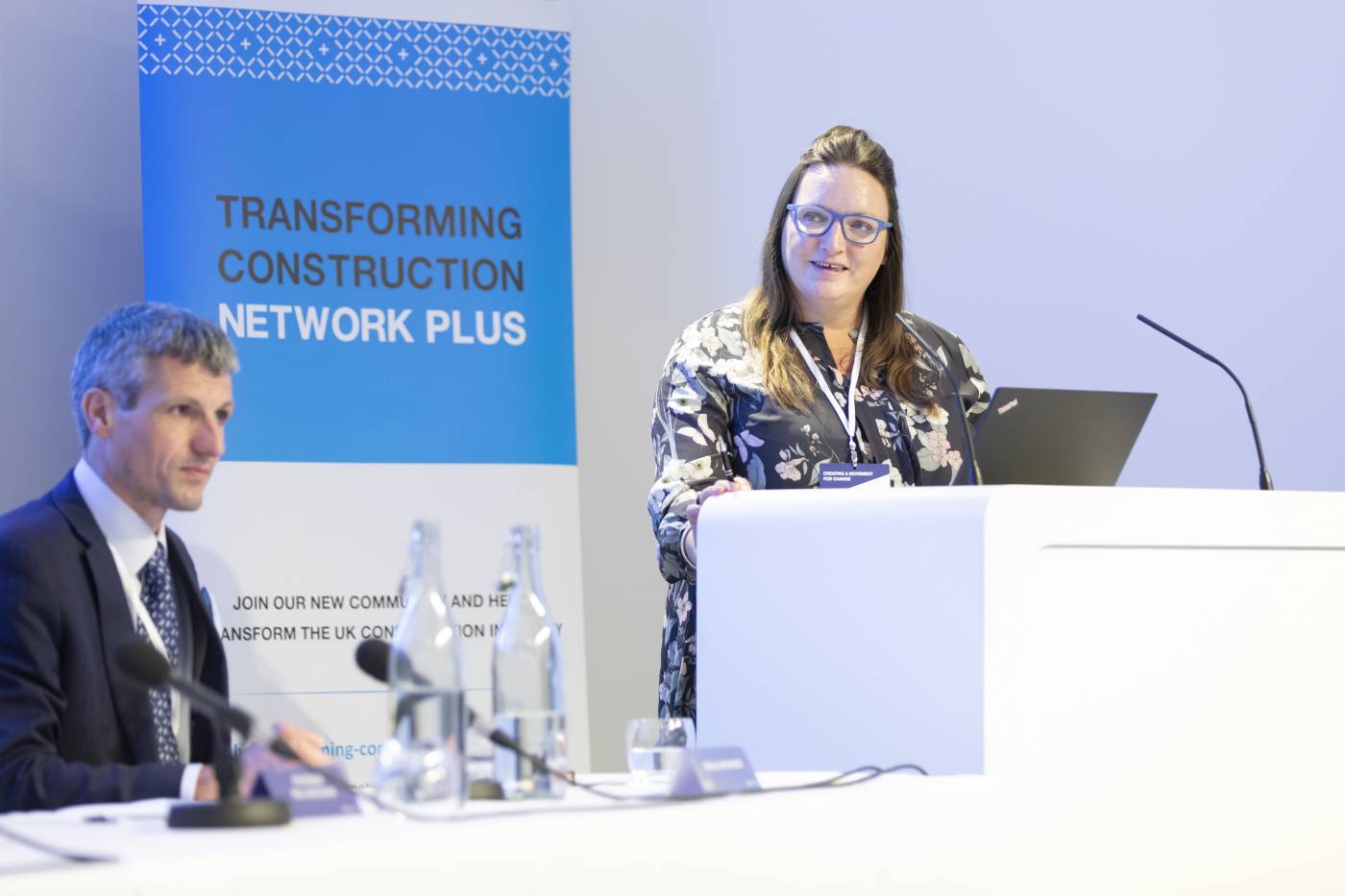
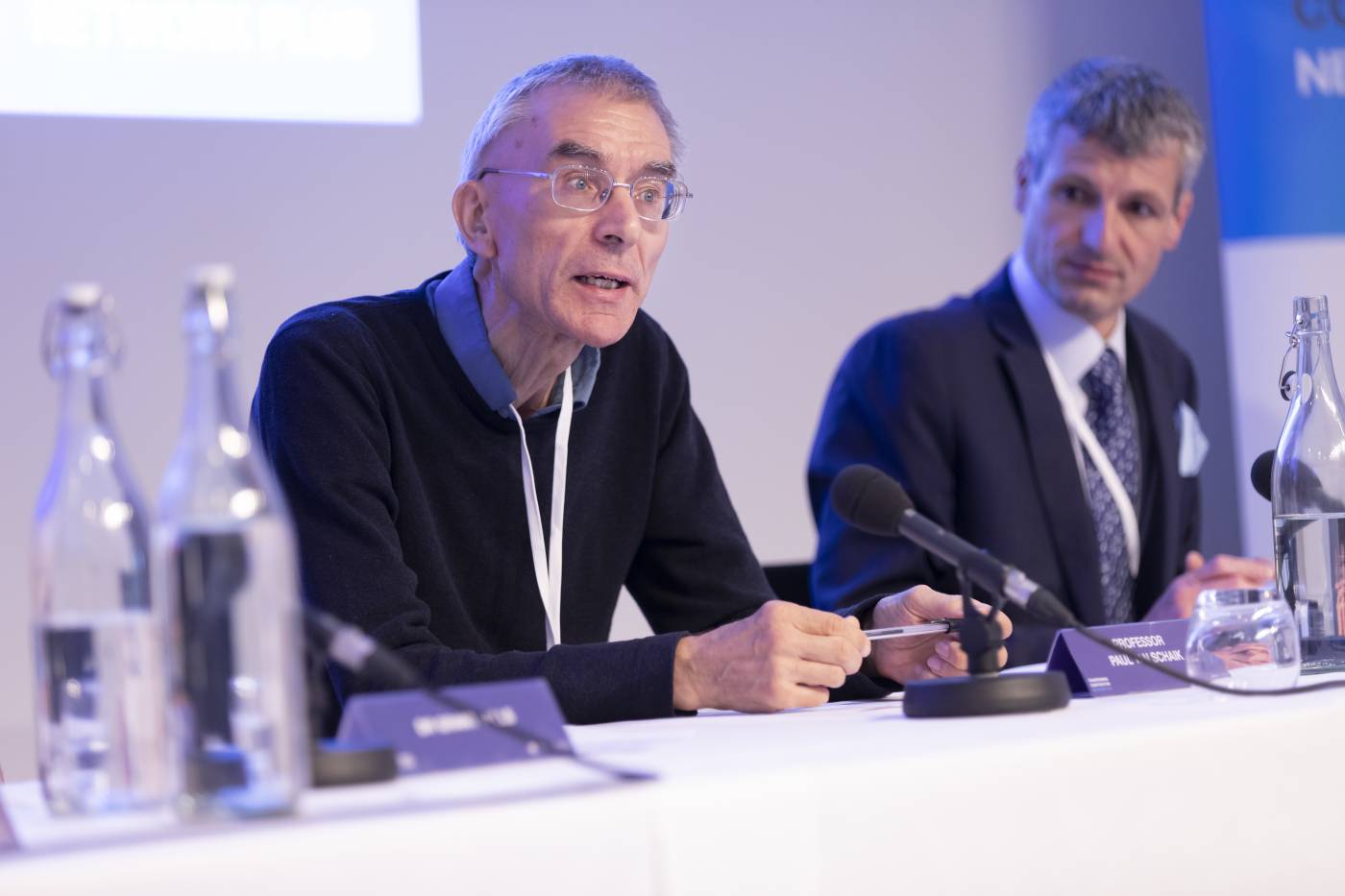
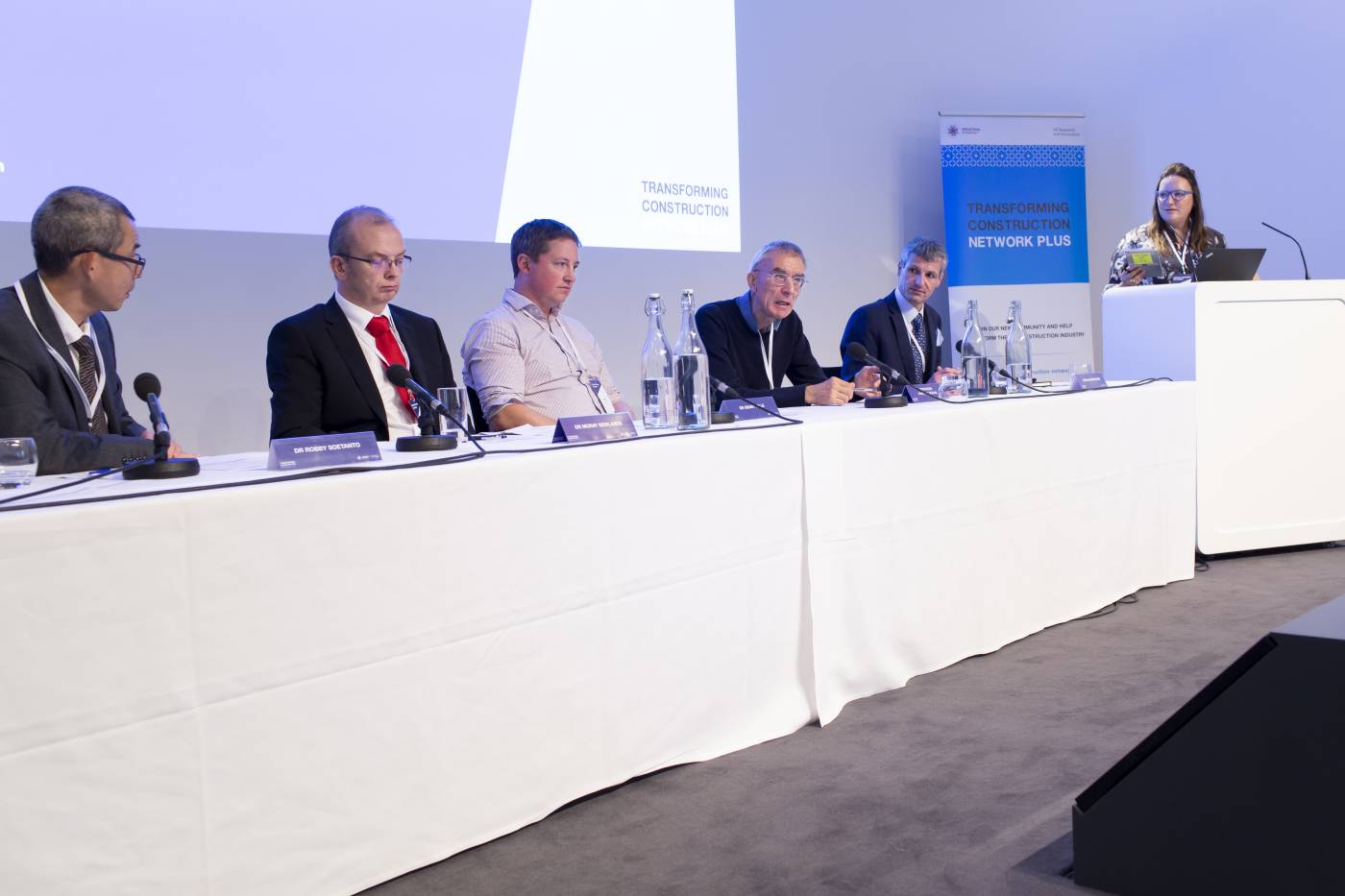
Creating our future: programmes inspiring change
Chaired by Professor Tim Vorley, Chair in Entrepreneurship and Director of the Centre for Regional Economic and Enterprise Development at Sheffield University Management School, the first afternoon session explored new routes and opportunities for the construction sector.
Presenting a perspective on productivity from outside of the construction industry, Professor Tim Vorley explored how we might create new opportunities to improve productivity. He highlighted some of the root causes of low productivity including a lack of investment by companies, and the existence of ‘zombie’ companies that have been sustained by low interest rates. Tim argued that productivity is not a simple equation, with gains following simple inputs. He reminded us that these gains arise in an open, emergent and complex system. Therefore, understanding and addressing the productivity challenge requires a systems perspective and interdisciplinary working. He also highlighted the impacts of product, process and organisational innovation on growth and productivity respectively in a slide that attracted much attention. In concluding, Tim reminded the audience that new opportunities to improve productivity exist, but that identifying the most relevant opportunities requires a rigorous understanding of the context within which interventions might be applied.
Professor Jennifer Whyte, Laing O’Rourke/RAEng Chair in Systems Integration at Imperial College London, introduced the audience to the research component within the N+ programme, describing emerging research exploring business models and the role of research/industry collaborations in advancing the transformation of construction. After providing helpful definitions to distinguish business models and project delivery models from the sectoral system within which they operate, Jennifer described key ideas around system integration and the digital transformation of business models. She concluded by inviting attendees to support and participate in the research, which will continue into 2020.
Bringing an international perspective to the proceedings, Dr Daniel Hall, Assistant Professor at ETH Zürich, explored new business models. He outlined how historically, the main route to achieving competitive advantage was through cost minimisation, and how, in time, the opportunities to incrementally innovate costs tend to diminish. He explained that the introduction of new products is restricted in construction by the need to overcome industry fragmentation, so to overcome this, firms have become increasingly specialised, gaining advantage only at the component level. In doing so, they lose their ability to innovate at the system level, falling into a ‘mirroring trap’, a form of lock-in. He then presented three approaches to escaping the mirror trap identified through his research – spin-off, vertical integration, or digital systems integration. He concluded by describing the industrialised construction approaches of Boklok and Katerra, and the potential threats that such types of firm might pose for existing businesses in the UK industry that have not yet begun to transform their own ways of working.
Following Daniel’s presentation, Mike Eggers, Vice President of Product and Innovation at Project Frog, described by video their work with Autodesk in creating KitConnect, a scalable BIM configurator tool that leverages Autodesk Forge. KitConnect enables your digital kit of parts to scale, digital components that contain the rules and logic by which each function. It can be used to address the immense variability of requirements in construction projects, while integrating the typical tools used by consultants. Importantly, the software provides a link to on-site and off-site members of the project team through familiar tools, such as web browsers. This enables integration of manufacturing and construction workflows and a full audit trail.
Download the presentation slides - session 3 [pdf, 3.73 MB]
Watch Mike Eggers presentation.
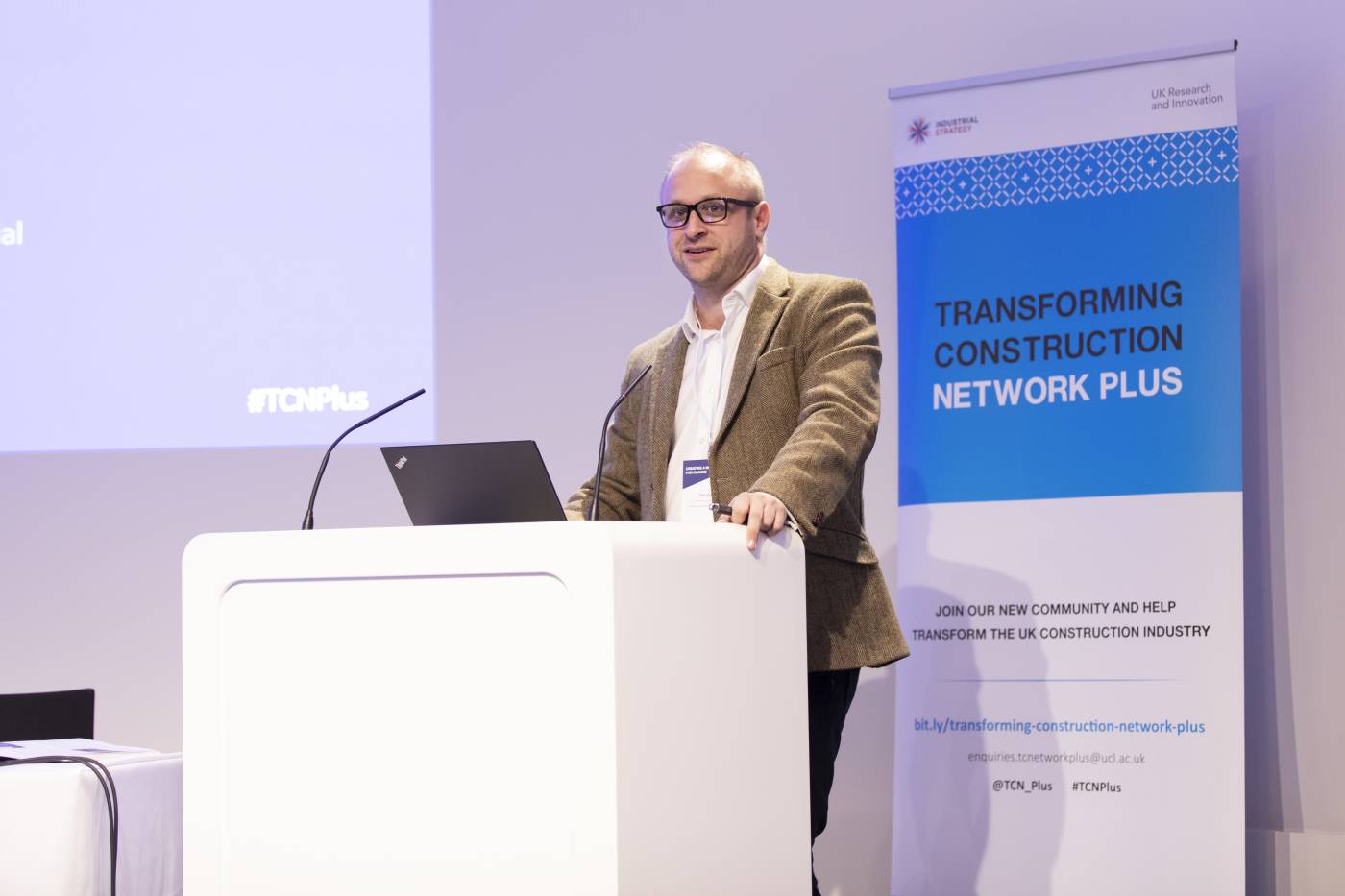
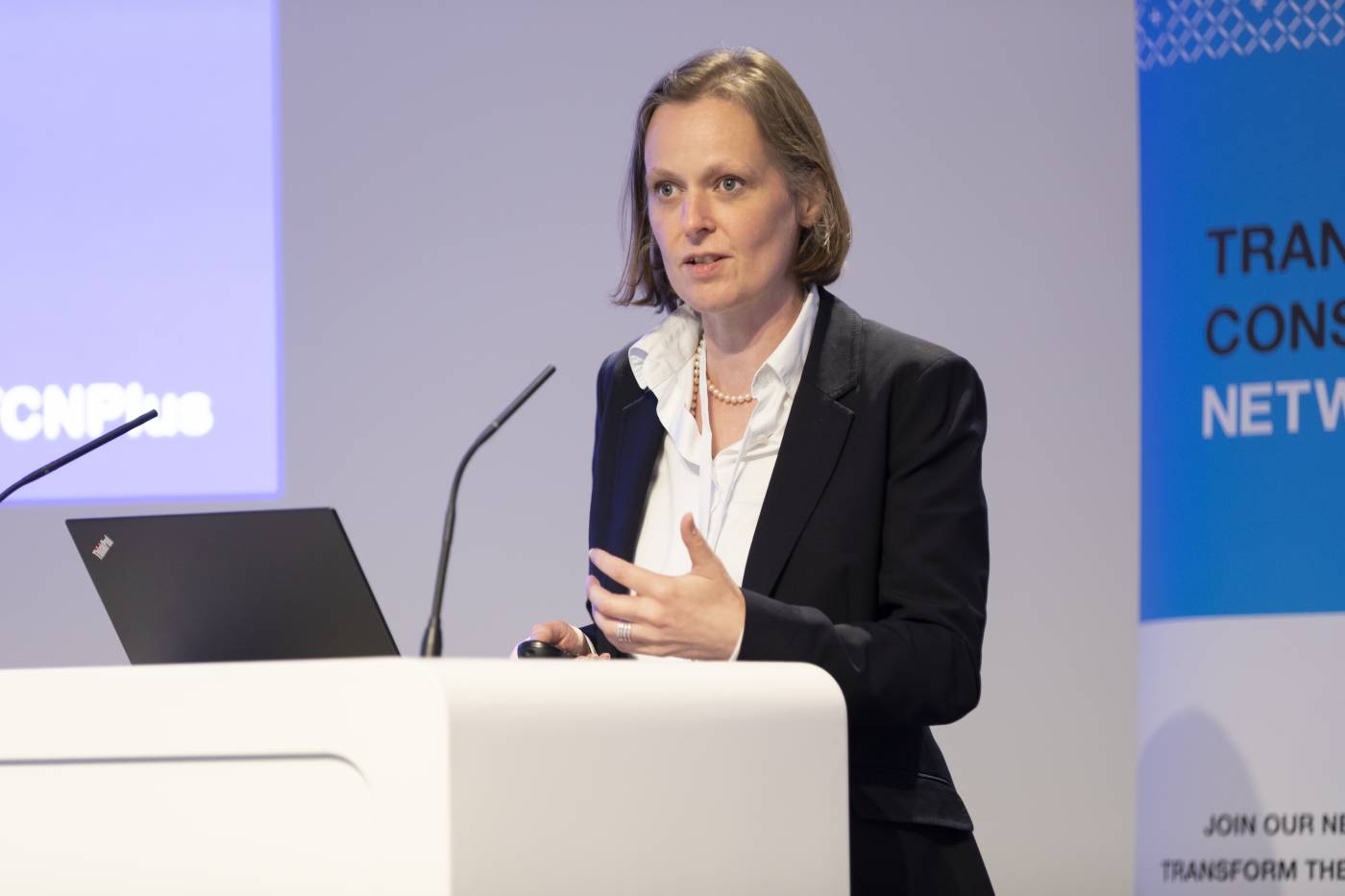
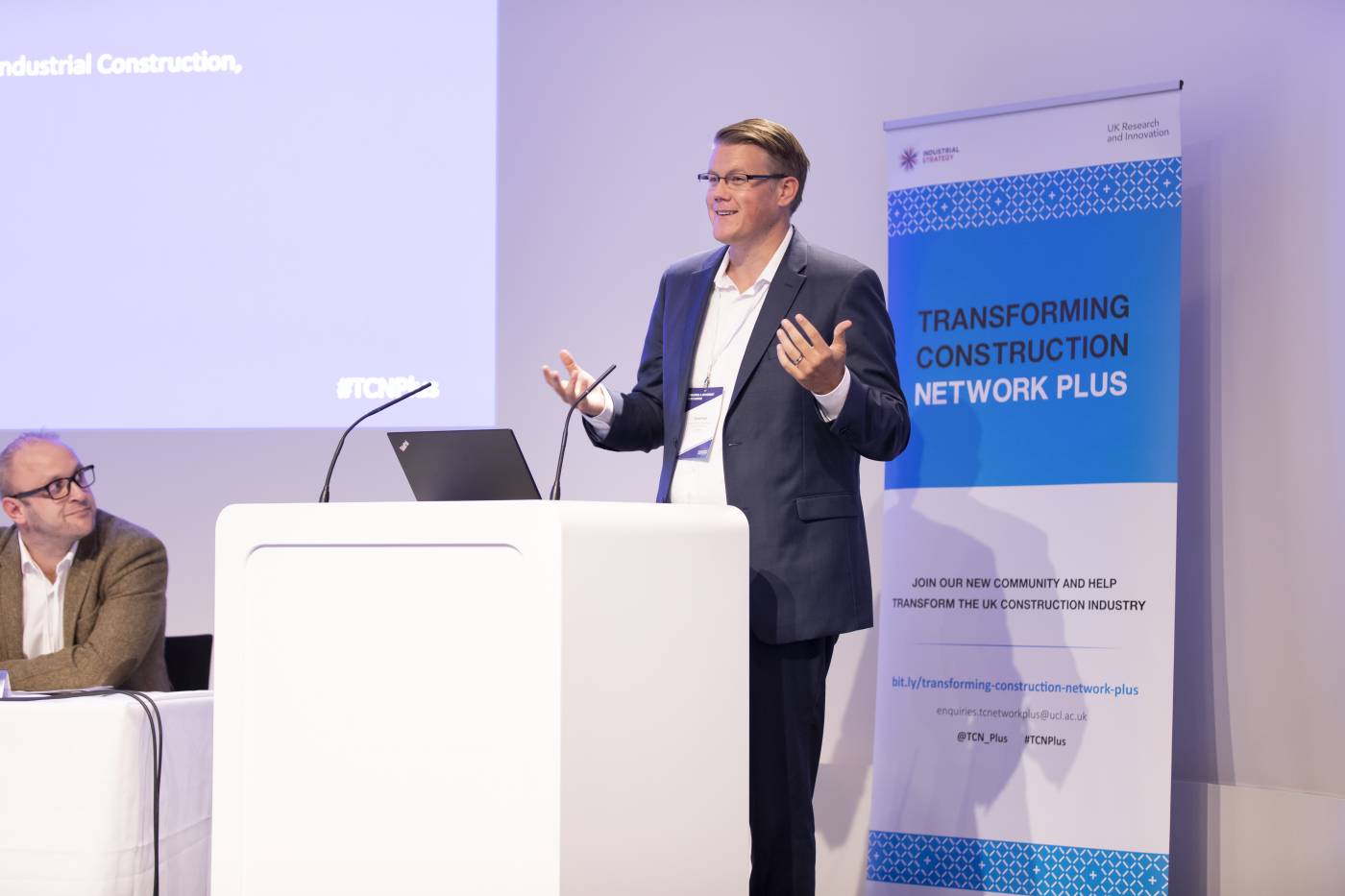
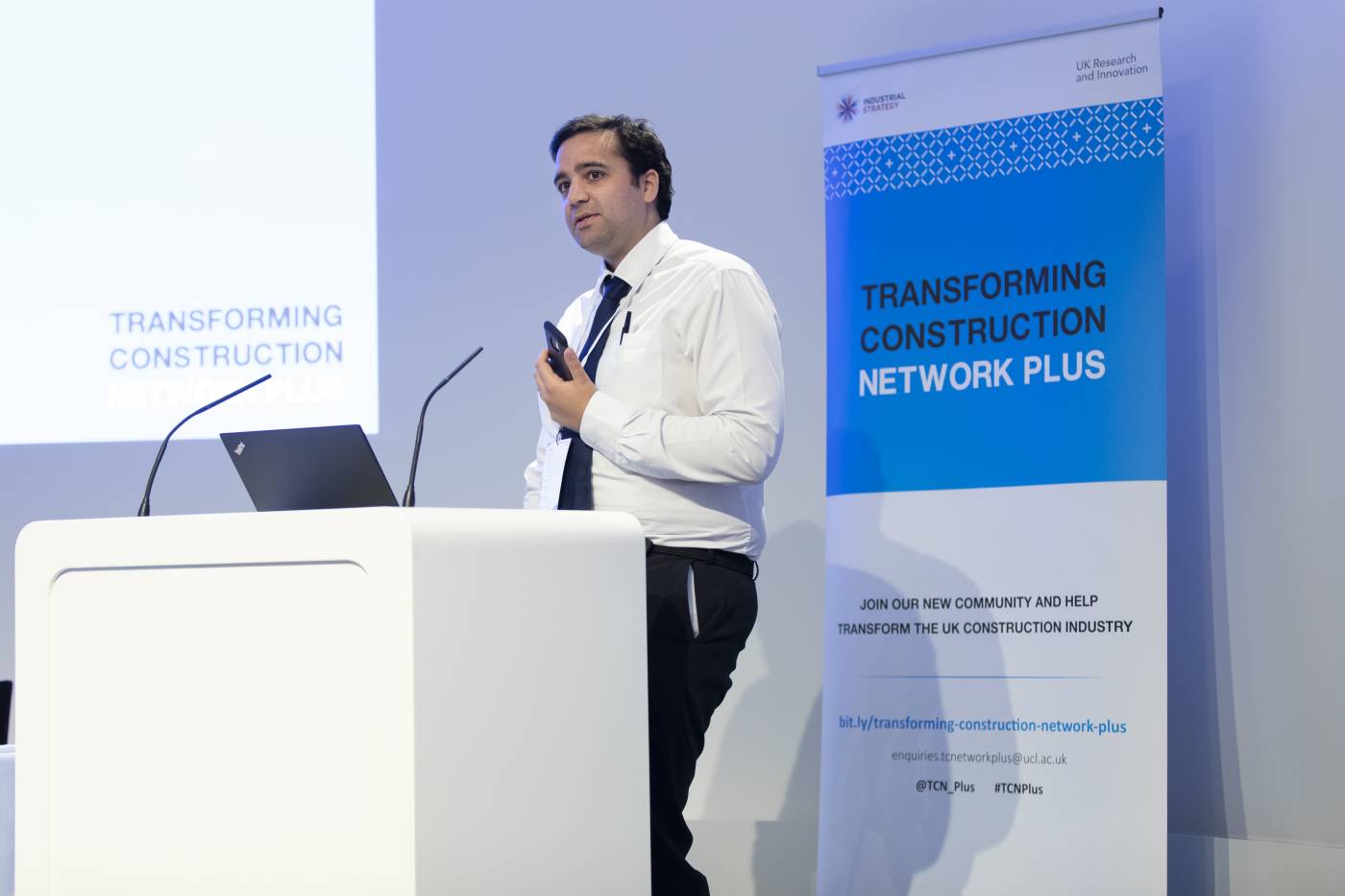
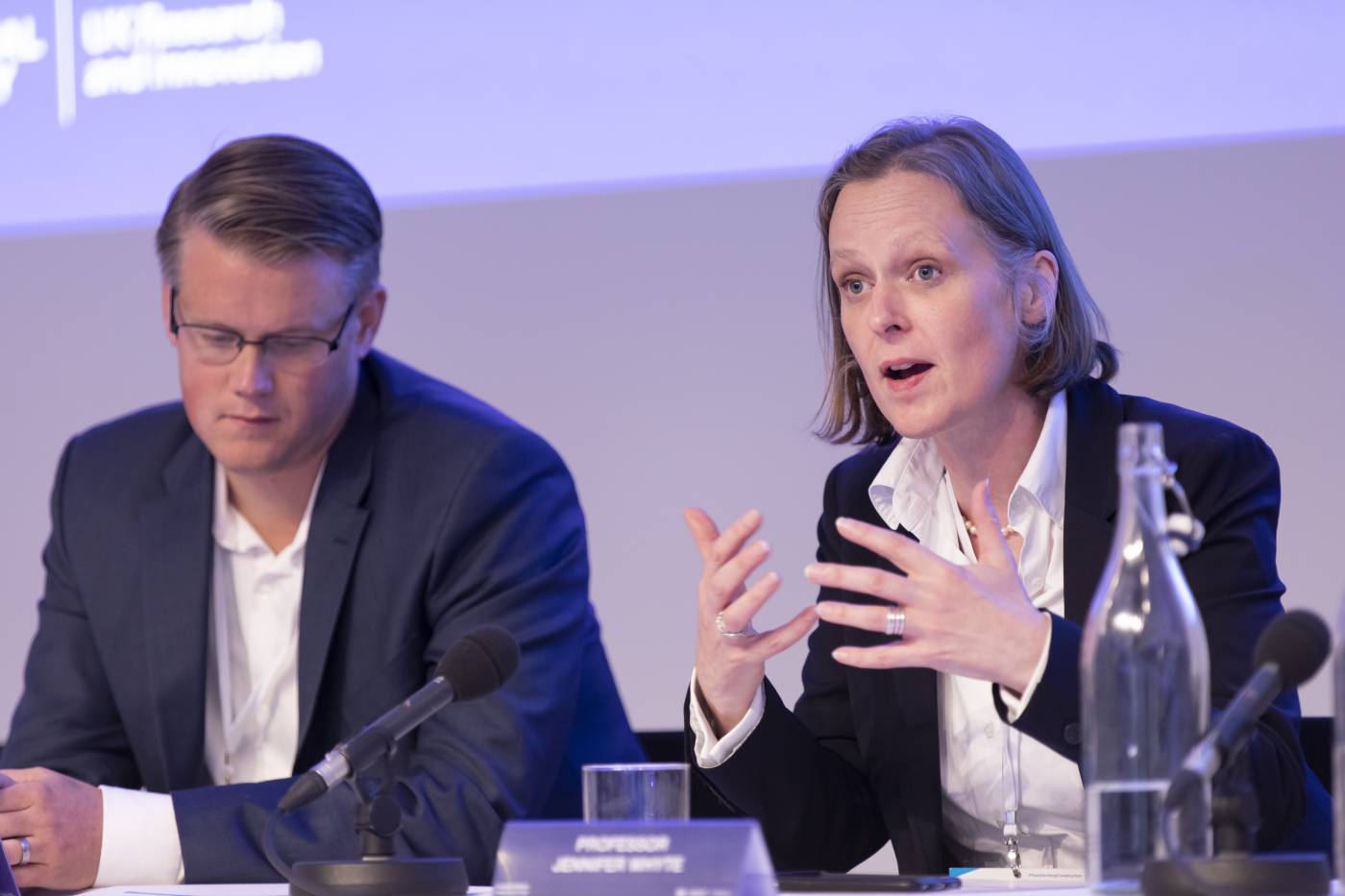

Creating our projects: learning from a changing environment
The final session of the day featured speakers from different backgrounds and perspectives. The session, chaired by Dr Jennifer Schooling, Director of the Centre for Smart Infrastructure and Construction at the University of Cambridge, brought together John Pelton, Programme Director at Jacobs, Dr Anne Kemp, Chair of UK BIM Alliance, and David Adams, Technical Director at Melius Homes. The session concluded with a panel discussion moderated by Dr Mike Pitts, Deputy Challenge Director of the Transforming Construction Challenge at Innovate UK.
John Pelton from Jacobs kicked off the session with his reflections on lessons learned from major programmes. John highlighted the opportunity that major projects create for innovation and to implement best practices in governance, commercial and digital to support industry transformation. Such projects are at such a scale and schedule that there is typically a good opportunity to explore new options properly, and to establish sensible returns on investments during the programme. He described how the 2012 London Olympics was governed by a strong vision to leave a legacy for the UK, leading to the project being focused on the value and benefits of the outcomes rather than outputs. The innovations which arose came about through strong leadership and collaboration.
John’s brief introduction to digital twins was developed further by Dr Anne Kemp who updated the audience with the latest news on the digital transformation of the industry. Anne explained that BIM is coming of age, with information management being key to successful implementation over projects’ lifecycles. She also noted how recent guidance on ISO 19650 will support those hoping to adopt BIM best practices – the guidance was produced by a collaboration between the UK BIM Alliance, BSI and the Centre for Digital Built Britain (CDBB) in Cambridge. Anne updated the audience on the work underway at Atkins and also the CDBB, which aims to facilitate the development of a national digital twin – an ecosystem of connected digital twins – and the supporting Gemini Principles that will facilitate interactions between twins.
‘An unexpressed desire can only be met through luck’ – David Adams, Technical Director, Melius Homes
The speaker programme opened with an exploration of the challenges to delivering better in-use performance. It was fitting, therefore, that the final speaker was David Adams who demonstrated how Melius Homes were overcoming the technical and practical challenges of achieving net zero retrofits. He described how the Energiesprong principles, developed in The Netherlands, have enabled Melius Home to undertake whole-building refurbishment and retrofit works, delivering better building performance. These interventions reduce energy costs, and the savings can be used to fund the retrofit. With proper planning and coordination, Energiesprong refurbishments can be completed within days, rather than weeks, and performance is guaranteed for at least 30 years.
Downlod the presentation slides - Session 4 [pdf, 5.20 MB]
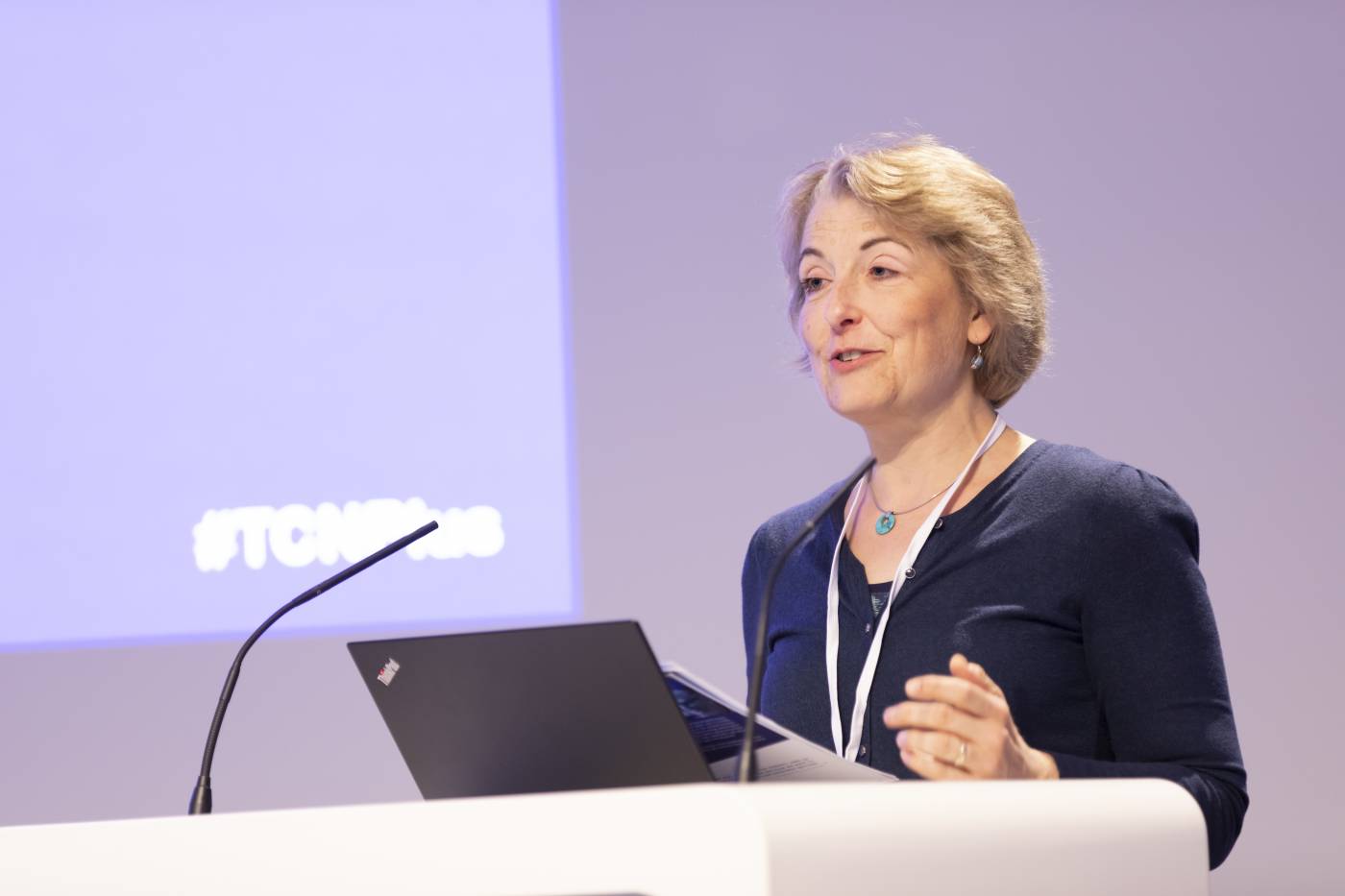
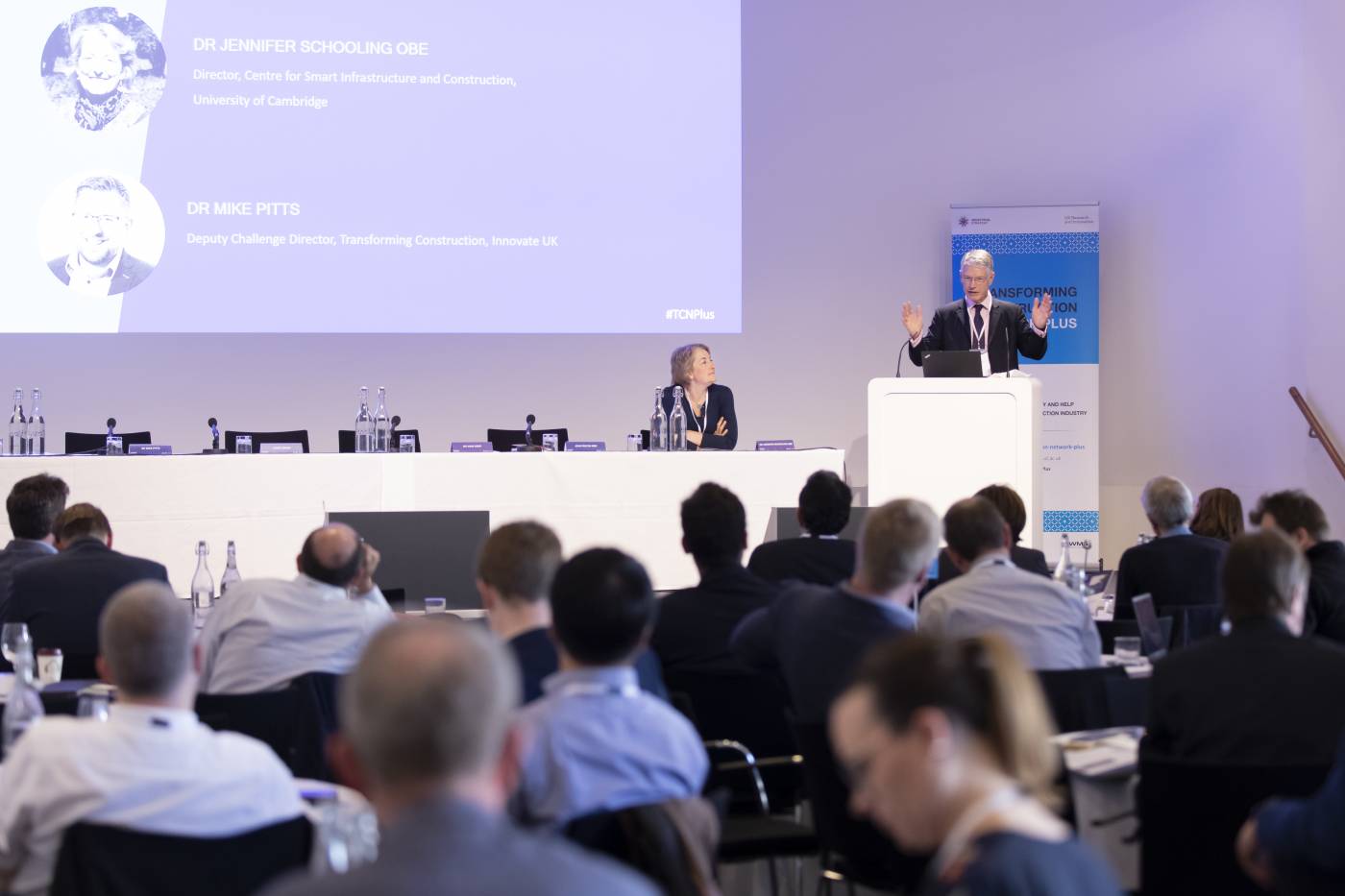
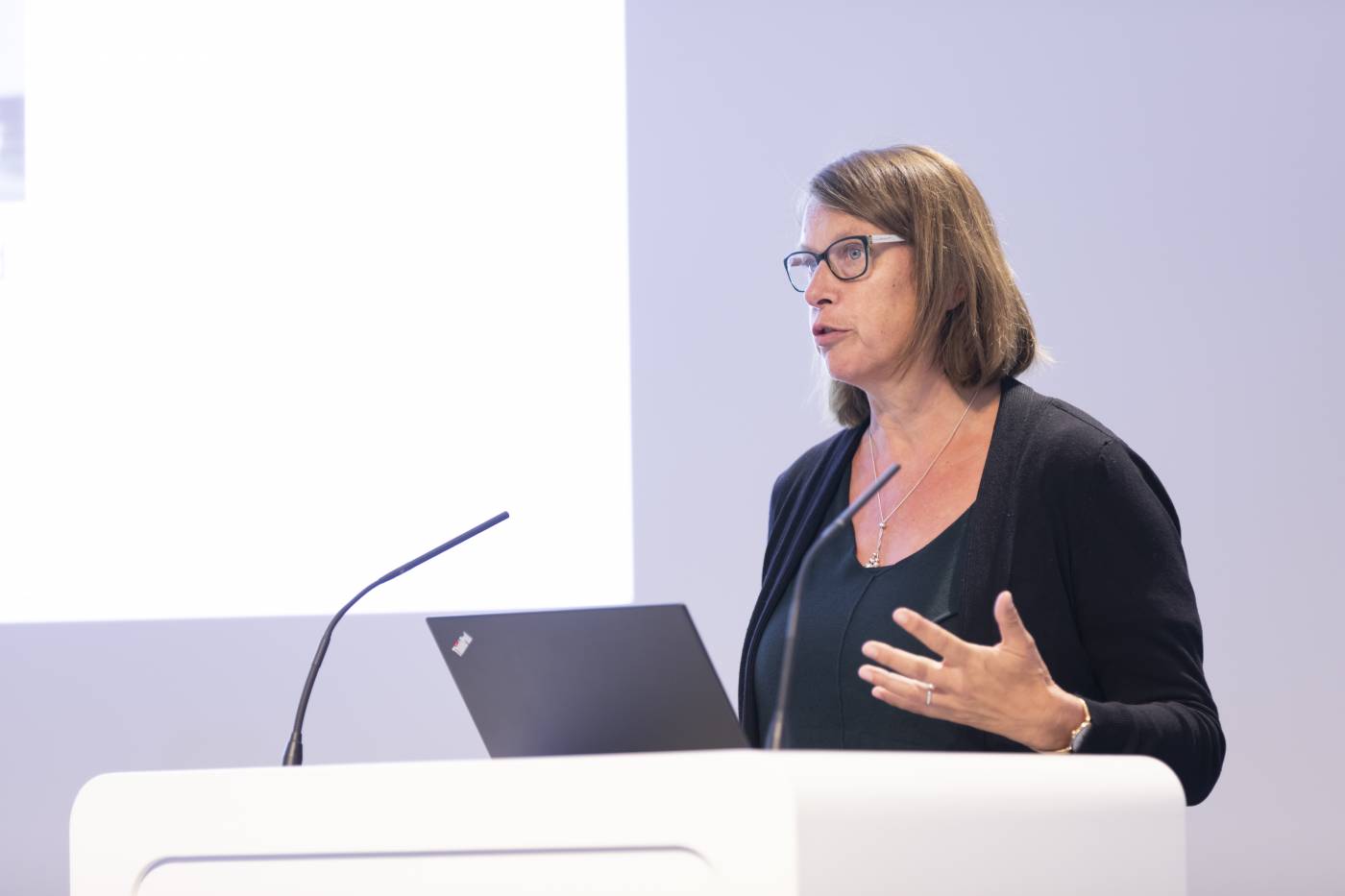
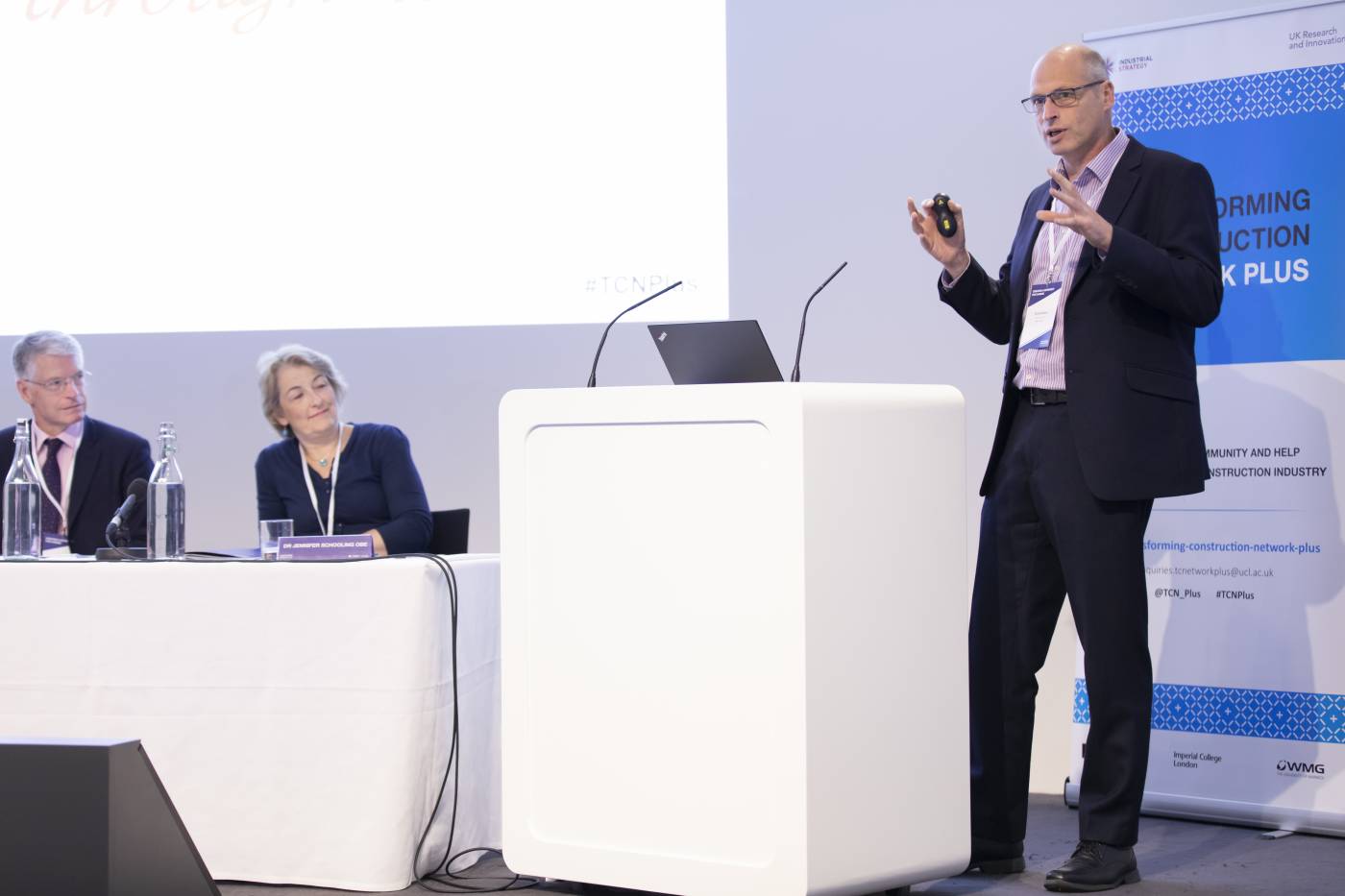
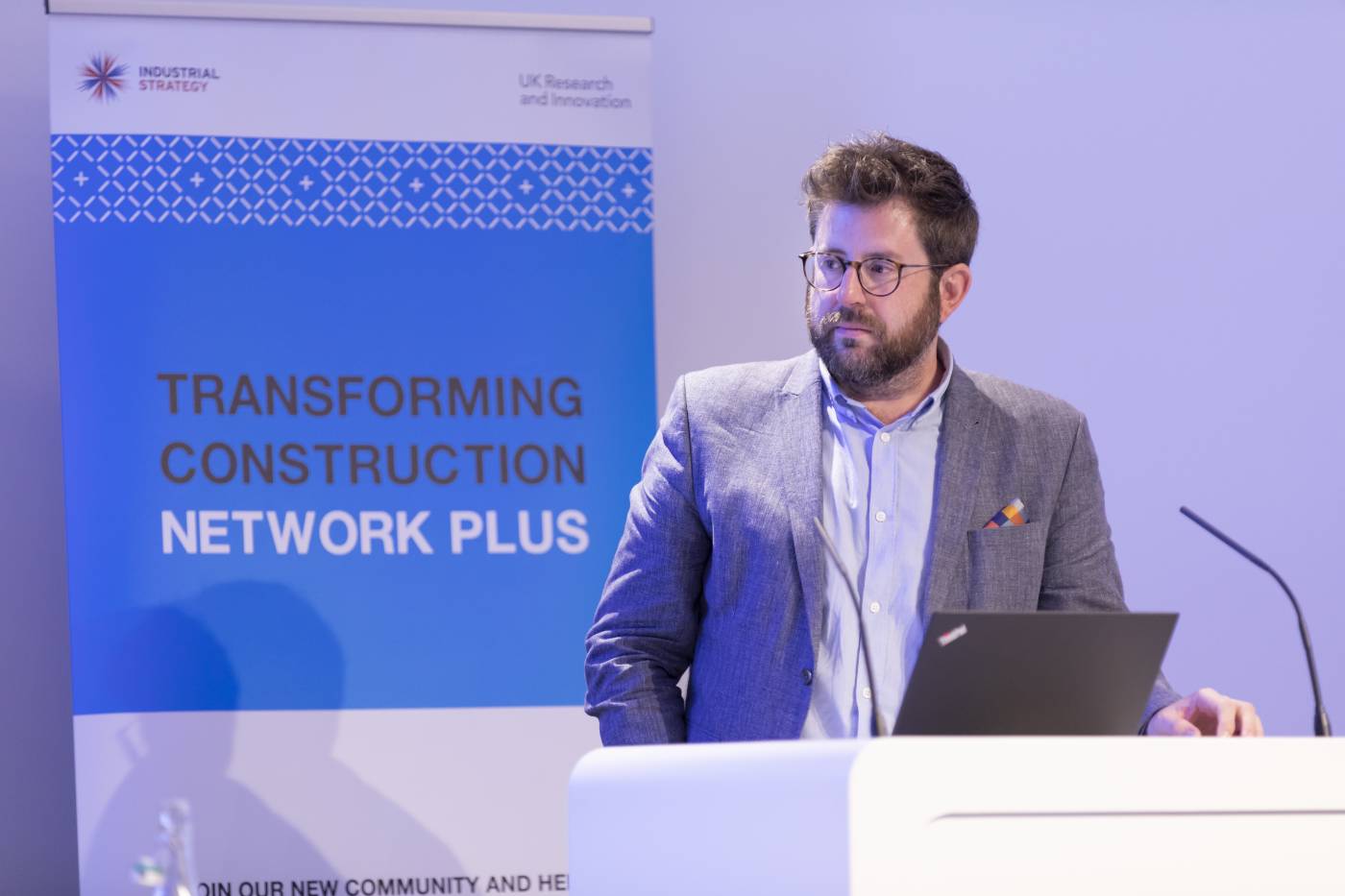
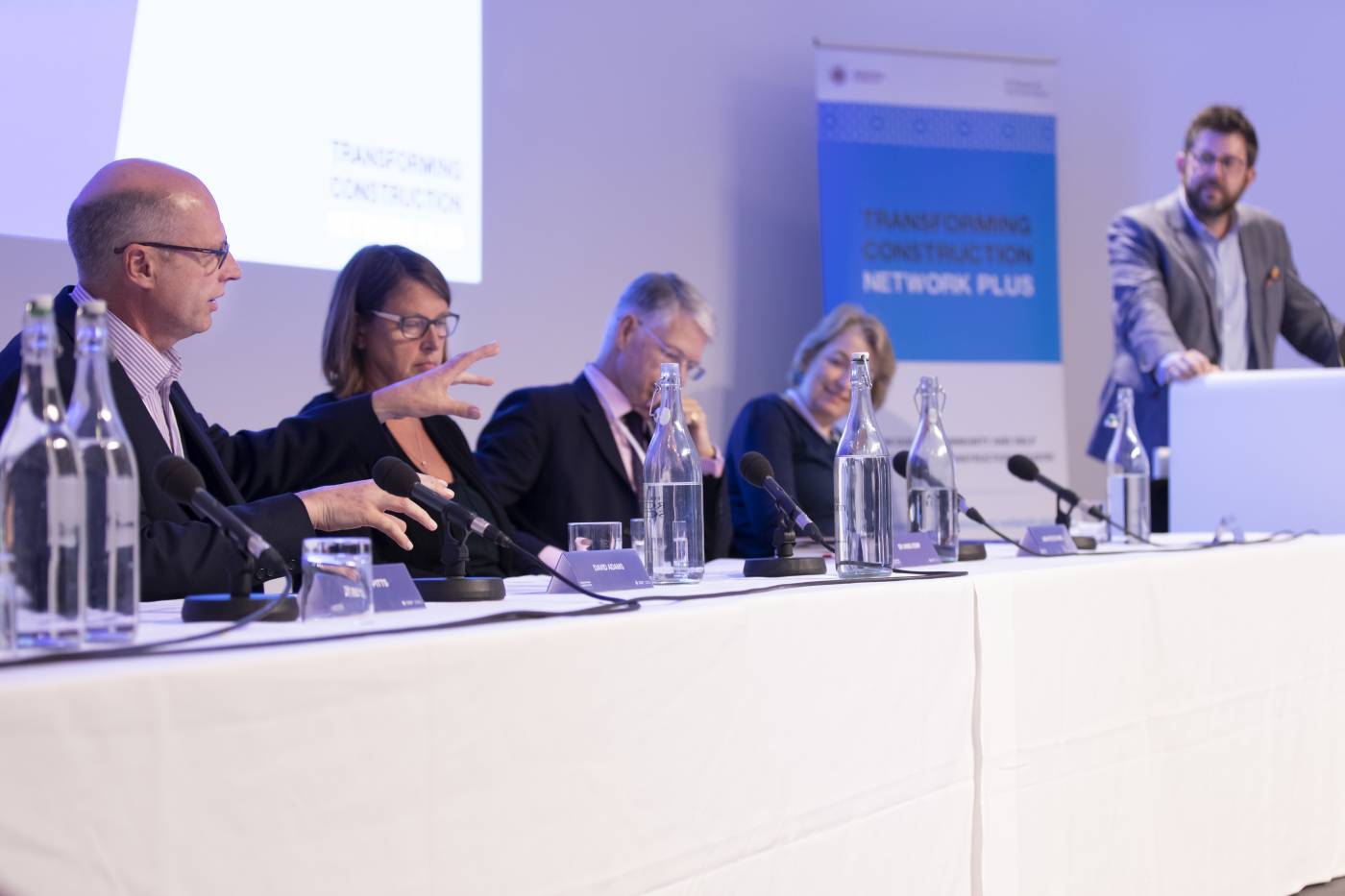
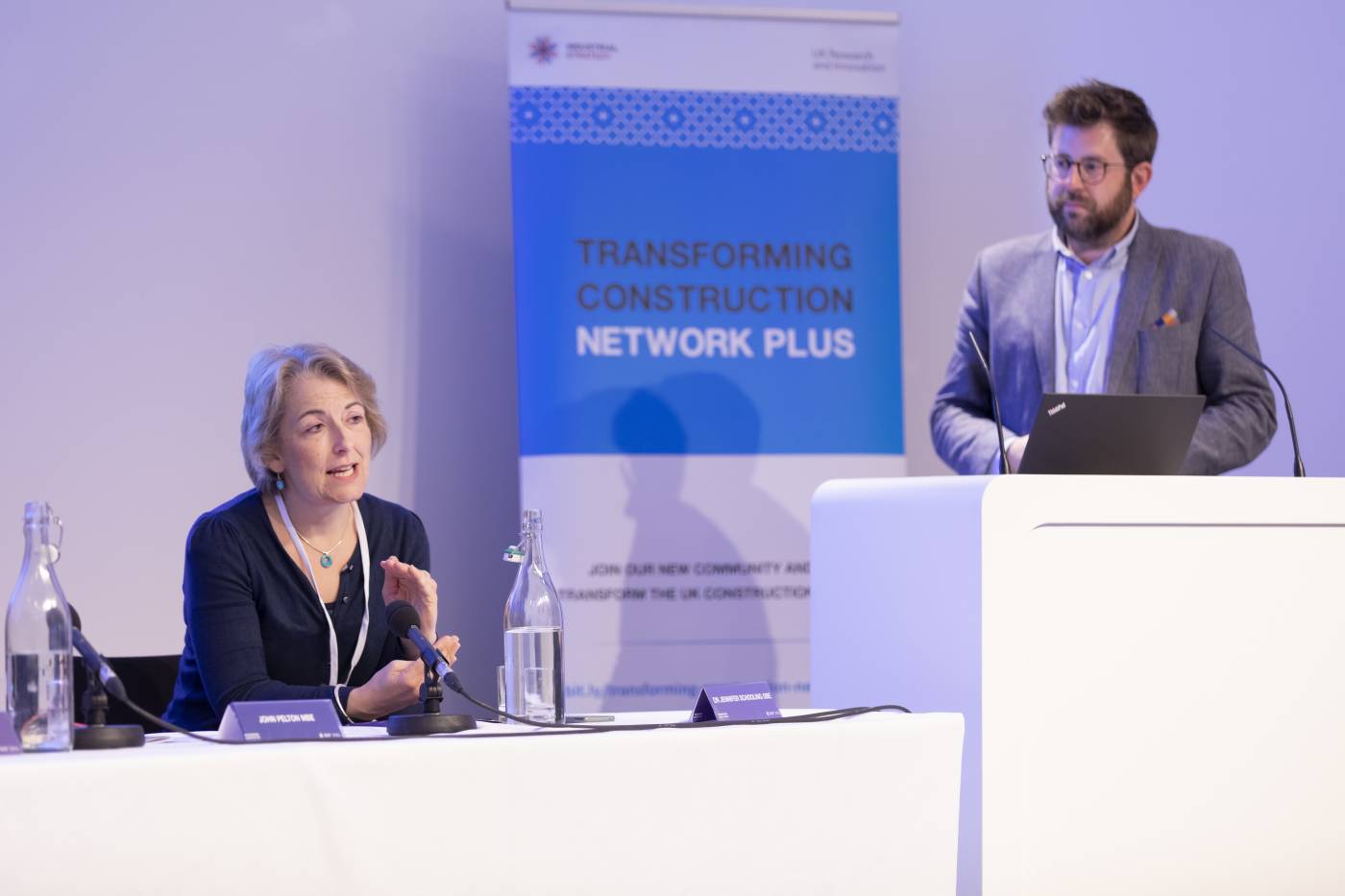
Transforming Construction Network Plus Second Funding Call
Presented by Professor Jacqueline Glass, the day was concluded by the launch of the second funding call. This funding call will address the biggest problems facing the construction industry and aligns with the expectations of the Industrial Strategy and the Transforming Construction Challenge’s core themes of:
- designing and managing buildings through digitally-enabled performance management
- constructing quality buildings through an offsite manufacturing approach
- reducing energy demand by improving quality of build and powering buildings through embedded active technologies
For this second round the N+ is offering two schemes to potential applicants. Building on the success of the first round, the N+ is continuing with the small research project scheme. In addition, and to encourage Early Career Researchers to take part in the Transforming Construction Challenge, the N+ is offering a discipline-hopping scheme.
More information regarding the funding call can be found on the N+ website.
Aiming to create a dialogue between academics, industry and government representatives, this event was the first N+ Conference. The day featured an array of leading speakers and thinkers, and offered the opportunity for attendees to go beyond their own expertise and make new connections across the construction industry. The N+ team was pleased to welcome so many people willing to share their insights and learn from one another.
Professor Jacqueline Glass, Principal Investigator, concluded:
We were delighted that the conference achieved its objectives of catalysing new ideas and collaborations. Delegates rated the day very positively, and reported making an average of more than five new connections at the event. More broadly, we heard in detail about some of the latest thinking around business model change that our community is keen to understand. It goes without saying that all this was set very carefully in a broader context of industry transformation, building performance, and environmental concerns.
Join the mailing list to hear about the latest N+ news, upcoming events, and funding opportunities.
Images © www.nickrphotography.com
 Close
Close


 The
The